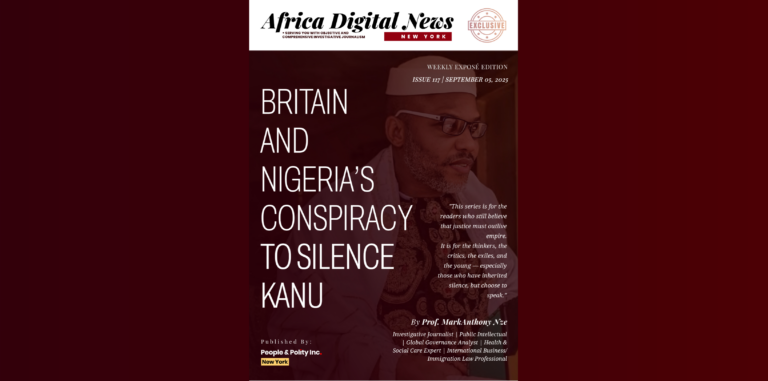“This series is for the readers who still believe that justice must outlive empire.
It is for the thinkers, the critics, the exiles, and the young — especially those who have inherited silence, but choose to speak.”
By
Prof. MarkAnthony Nze
Investigative Journalist | Public Intellectual | Global Governance Analyst | Health & Social Care Expert | International Business/Immigration Law Professional
Editorial Statement
On Bearing Witness to Suppressed Truths
This 12-part exposé, Britain & Nigeria’s Conspiracy to Silence Kanu, is not merely a historical or legal analysis. It is a work of journalistic reckoning — an attempt to restore voice, memory, and visibility to a cause long buried by power.
We undertook this investigation because the silence around Nnamdi Kanu, IPOB, and Biafra is not accidental. It is strategic. It is enforced. And it has been normalized by two governments — one postcolonial, the other post-imperial — who benefit from suppressing a people’s right to self-determination.
This project challenges that silence.
In a media landscape often driven by political caution and global hierarchy, Biafra is rarely given space. Kanu’s illegal rendition, indefinite detention, and erasure from British diplomatic concern are treated as minor footnotes. Yet if these abuses had occurred in Iran, China, or Russia, they would be front-page news. The double standard is glaring — and dangerous.
As editors, we believe in journalism that confronts uncomfortable truths, especially when those truths implicate the systems and nations that claim moral superiority. Britain’s role in Nigeria’s colonial formation — and its complicity in the Biafran War — cannot be separated from its refusal to act today. This is not history. It is continuity.
We also acknowledge the risk of oversimplification. This exposé does not suggest that Biafra’s path is easy, perfect, or free of complexity. But it insists — firmly — that the right to organize, to dissent, and to seek justice must not be criminalized.
This series is for the readers who still believe that justice must outlive empire.
It is for the thinkers, the critics, the exiles, and the young — especially those who have inherited silence, but choose to speak.
We publish this not because it is popular, but because it is necessary.
Let the record show:
Biafra was not forgotten.
It was silenced.
And now, it speaks again.
— The Editorial Board
People & Polity Inc., New York
Executive Summary
This series investigates the deliberate, coordinated efforts by the Nigerian and British governments to silence Nnamdi Kanu — leader of the Indigenous People of Biafra (IPOB) — and suppress the wider dream of Biafran self-determination. Across 12 unique parts, it exposes the historical, geopolitical, legal, and diplomatic mechanisms deployed to erase the Biafran question from public consciousness while preserving postcolonial interests.
The journey begins by revisiting Britain’s colonial legacy, showing how Nigeria’s 1960 “independence” merely repackaged imperial influence. The same Britain that drew Nigeria’s artificial borders still defends them, not for unity or peace — but for access to oil, control over regional power dynamics, and preservation of its geopolitical relevance in West Africa.
The exposé details how Biafra, the breakaway region that once declared independence in 1967, remains a lingering threat to Britain’s post-imperial order. Nnamdi Kanu’s rise reawakened global attention to Biafra’s unfinished struggle. But instead of addressing the movement’s legitimate grievances, the Nigerian state labeled IPOB a terrorist group — with Britain’s tacit approval.
Through a combination of extraordinary rendition, media blackouts, judicial manipulation, and diplomatic stonewalling, both nations have conspired to suppress the movement’s visibility and legitimacy. British silence in the face of Kanu’s illegal abduction and detention — despite his citizenship — reveals a disturbing double standard in how the UK applies human rights advocacy: bold in Ukraine or Hong Kong, mute in Biafra.
The series also exposes how IPOB’s global diaspora network has transformed Biafra into a transnational movement, uncontained by geography or censorship. Yet these peaceful, legal expressions of solidarity are increasingly surveilled, undermined, or ignored by governments supposedly committed to free expression.
As the series closes, it asks: what happens when the world refuses to listen? What are the consequences of ignoring court rulings, weaponizing silence, and pretending a people’s identity can be erased?
Biafra, it argues, is not a rebellion — it is a question the world has yet to answer. And as long as that question endures, neither Britain nor Nigeria can claim moral high ground while denying justice to those they once colonized and continue to silence.
This exposé is not just about Kanu.
It is about memory.
It is about empire.
It is about the cost of silence.
Part 1: The Colonial Legacy That Never Ended
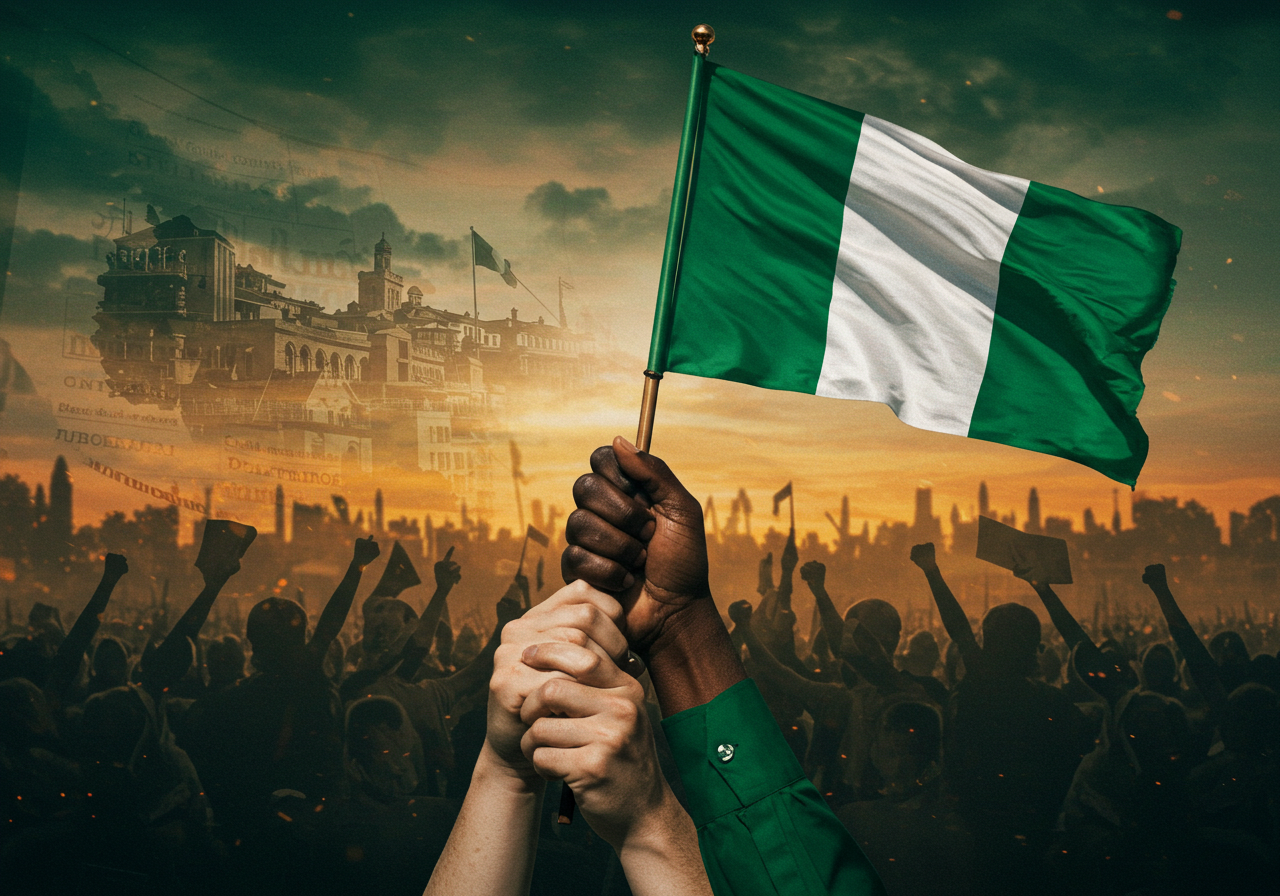
How Britain’s 1960 “handover” was only a redesign of control, ensuring Nigerian unity under their influence
1.1 – The Flag Came Down, But the Empire Stayed
On October 1st, 1960, Nigeria stood before the world as a newly independent nation. The Union Jack was lowered, the green-white-green raised, and colonial rule was declared over. But beneath the jubilant parades and official speeches, Britain had not exited Nigeria—it had only changed position. Power was not relinquished. It was restructured.
The British departure from governance was not a retreat but a recalibration. Advisors stayed. Legal frameworks stayed. Most importantly, economic and strategic interests remained deeply entrenched. Nigeria was handed to Nigerian rulers—but with a roadmap drawn in London.
1.2 – Nigeria: A Nation Created for Administrative Convenience
To understand the mechanisms of Britain’s continued grip, we must go back to 1914. That year, Lord Frederick Lugard, acting on orders from Whitehall, amalgamated the Northern and Southern Protectorates into a single administrative entity: Nigeria. The goal wasn’t unity; it was control.
The North, largely Muslim and ruled indirectly through emirs, was economically unproductive but politically useful. The South, richer in resources and educated elites, was harder to control but vital for trade. By combining them, Britain engineered a colonial machine where the more developed South would subsidize the governance of the North—and London could govern more efficiently through a single colonial administration.
It was never a nation in the organic sense. It was a colonial project, stitched together by bureaucratic fiat and held together by British law.
1.3 – The British Blueprint: Divide, Rule, and Favor
Throughout colonial rule, Britain employed a strategy that would outlast their formal exit: divide and rule. This involved reinforcing ethnic divisions, encouraging regional competition, and cultivating dependent elites. But more subtly, it meant selecting winners and losers.
The Northern Region—vast, conservative, and feudal—was favored. The British viewed its traditional rulers as reliable, “stable” partners who would uphold colonial frameworks. Meanwhile, the more westernized, entrepreneurial, and politically dynamic South—particularly the Igbo—was seen as unpredictable and too eager to disrupt imperial interests.
By independence, Britain had already laid the groundwork for a power structure that favored Northern dominance—ensuring that political control would remain in the hands of those most likely to protect British interests.
1.4 – 1960: An Independence Designed for Continuity
While the world applauded Nigeria’s peaceful independence in 1960, London was conducting a quiet symphony of continuity. Shell-BP, then a largely British company, held exclusive oil exploration rights. British judges were still on Nigeria’s Supreme Court. Nigerian military officers continued training at Sandhurst. Key ministries were guided by British advisors.
The 1960 constitution, though domestically celebrated, was designed to keep Nigeria in the British orbit. Even the ceremonial head of state remained Queen Elizabeth II until 1963, making Nigeria a monarchy in all but name.
In effect, colonial rule was rebranded—not dismantled.
1.5 – The Igbo Question: Success as a Threat
The Igbo of southeastern Nigeria had undergone a dramatic transformation during colonial rule. Western education, Christianity, and internal mobility allowed them to rise swiftly in commerce, academia, and civil service. By the 1950s, they were overrepresented in many key sectors of national life.
This rise did not go unnoticed. It bred resentment in the North and suspicion in London. To British officials, the Igbo were not just ambitious—they were politically dangerous. Leaders like Nnamdi Azikiwe and later, Chukwuemeka Odumegwu Ojukwu, had pan-African visions that did not align with British geopolitical goals.
Thus, when Nigeria’s post-independence crisis erupted, the Igbo were not merely collateral damage—they were viewed as a threat to the post-colonial order Britain had spent decades engineering.
1.6 – London’s Quiet Engineering of Post-Independence Nigeria
The years following independence were marked by mounting instability. But what appeared to be a Nigerian problem—ethnic tensions, coups, secession threats—was in many ways the fallout of British design.
Declassified Foreign Office cables from the 1960s reveal that Britain remained deeply embedded in Nigerian politics. British diplomats advised successive Nigerian governments, prioritized oil security, and quietly opposed any regionalism that could threaten the flow of crude from the Niger Delta.
When Biafra declared independence in 1967, Britain’s choice was swift and brutal: it armed and supported the Nigerian federal military to preserve national unity—not out of principle, but out of petroleum interest.
1.7 – The Biafran War: Britain Picks a Side
During the Nigerian Civil War (1967–1970), also known as the Biafran War, over a million civilians—mostly Igbo—died from starvation, blockades, and bombing campaigns. International outrage surged. Images of malnourished children with swollen bellies filled global newspapers. The world demanded action.
Britain, however, held its line. Prime Minister Harold Wilson’s government continued to supply the Nigerian military with arms and ammunition. British warships quietly aided federal operations. And in diplomatic corridors, the UK lobbied hard to prevent international recognition of Biafra.
To London, Biafra represented the worst-case scenario: a resource-rich, assertively independent black nation with a grievance against the empire. Its success could trigger a domino effect across Africa—from Katanga to Zanzibar. It had to be stopped.
1.8 – Britain’s Oil-First Doctrine in Nigeria
Oil, discovered in commercial quantities in Oloibiri in 1956, transformed Britain’s stake in Nigeria from colonial obligation to energy necessity. By the early 1960s, the Niger Delta had become the centerpiece of British foreign policy in West Africa.
Shell-BP (a joint British-Dutch venture) was granted near-monopoly access to exploration rights across the region. These were secured not through open-market negotiations but through backdoor agreements drafted during the waning days of colonial rule. Successive Nigerian governments—many led by British-trained elites—upheld those contracts, often at the expense of local communities.
When the Eastern Region, home to the Delta and the Igbo heartland, seceded in 1967, London’s response was dictated not by concern for African unity—but by concern for oil. A sovereign Biafra controlling Nigeria’s energy lifeline would be catastrophic for British commercial and geopolitical interests.
So, Britain armed the side that promised continuity: the Federal Government in Lagos.
1.9 – Declassified Documents: Proof of Complicity
Today, decades after the Biafran War, newly declassified British government documents paint a clearer picture of complicity. Memos between the Foreign and Commonwealth Office and the Prime Minister’s Office reveal a deliberate strategy: avoid public entanglement, but maintain influence.
One such document, dated 1968, reads:
“Our interests are best served by the defeat of secessionist forces without overt British involvement.”
Behind the scenes, Britain was anything but neutral. It supplied arms, advised military tactics, and used its veto power in the United Nations to block international recognition of Biafra.
Even as famine spread and global charities called for a ceasefire, Britain stood firm. The calculus was simple: a unified Nigeria guaranteed oil. A victorious Biafra guaranteed instability.
1.10 – The Legal Continuity of Colonialism
Post-independence Nigeria maintained more than just British partnerships—it preserved British legal DNA. The Nigerian judiciary was modeled almost entirely on the British common law system. Its Constitution was drafted with heavy input from London-based legal experts. British judges served as consultants and, in some cases, continued to sit on appellate courts.
This legal architecture made it easier to suppress dissent. Laws crafted under colonial logic—such as the Public Order Act and sedition statutes—remained on the books. They were originally designed to quash anti-British resistance; now, they were repurposed to criminalize internal agitation like the Biafran movement.
Even the framing of secession as treason—rather than as a political right—has deep colonial roots. In Britain’s imperial worldview, no colony had the right to self-determine unless it aligned with imperial interests. Nigeria inherited that view wholesale.
1.11 – The Psychological Transfer of Power
Power is not only institutional—it is psychological. At independence, Nigeria was handed not just a British-designed state, but a British-designed mindset. Elites were trained in British schools, taught British history, and educated to view London as the center of political sophistication and moral authority.
This produced a class of postcolonial leaders who, even while railing against imperialism, remained emotionally and intellectually dependent on it. They adopted British accents, British dress codes, and Westminster-style parliamentary politics—while crushing internal movements like Biafra with the same force the British once used against African resistance.
This was not neocolonialism by coercion—it was neocolonialism by consent.
1.12 – Why Biafra Threatens Britain’s Nigeria Model
The Biafran movement, both in its original 1967 form and its contemporary resurgence under Nnamdi Kanu, represents more than a secessionist agenda. It is a direct ideological challenge to the Nigeria that Britain created.
A successful Biafra would validate the argument that Nigeria’s borders are illegitimate—that the amalgamation of 1914 was not nation-building but colonial engineering. It would inspire other marginalized groups—Ogoni, Middle Belt, even the Yoruba—to question the integrity of the union.
More dangerously for Britain, it would provide a legal and moral precedent for the reconfiguration of postcolonial African states. If one domino falls, others might follow. And in each of those dominos lie British investments, military bases, and diplomatic footholds.
Thus, the fight against Biafra is not just Nigeria’s. It is Britain’s too.
1.13 – A Legacy of Suppression Disguised as Unity
To this day, Britain’s position remains masked in diplomatic language: support for “one Nigeria,” concern for “regional stability,” respect for “sovereignty.” But beneath these phrases lies an old colonial reflex—the need to maintain the status quo at all costs.
This status quo has brought neither peace nor unity. Nigeria remains riven by ethnic distrust, economic inequality, and cycles of violent repression. The very structures designed by Britain to maintain control—centralized power, weak regional autonomy, extractive federalism—are now the source of Nigeria’s instability.
And yet, every effort to break from this mold—be it through decentralization, true federalism, or self-determination—is met with resistance from both Abuja and its old ally in London.
1.14 – The War That Never Ended
The guns of the Biafran War fell silent in 1970, but the war itself never ended. It simply evolved—from bombs to bureaucracy, from soldiers to silence. And in this new war, Britain remains a quiet combatant.
Nnamdi Kanu’s arrest, IPOB’s proscription, and the global censorship of Biafra’s case are not isolated incidents. They are part of a longer continuum that began not in 2021, nor 1967—but in 1914, when a distant empire drew lines across a map and called it Nigeria.
More than a century later, those lines still define—and confine—the future of millions. And the empire that drew them is still watching, still shaping, still silencing.
Part 2 – Biafra: The Secession Britain Fears Most
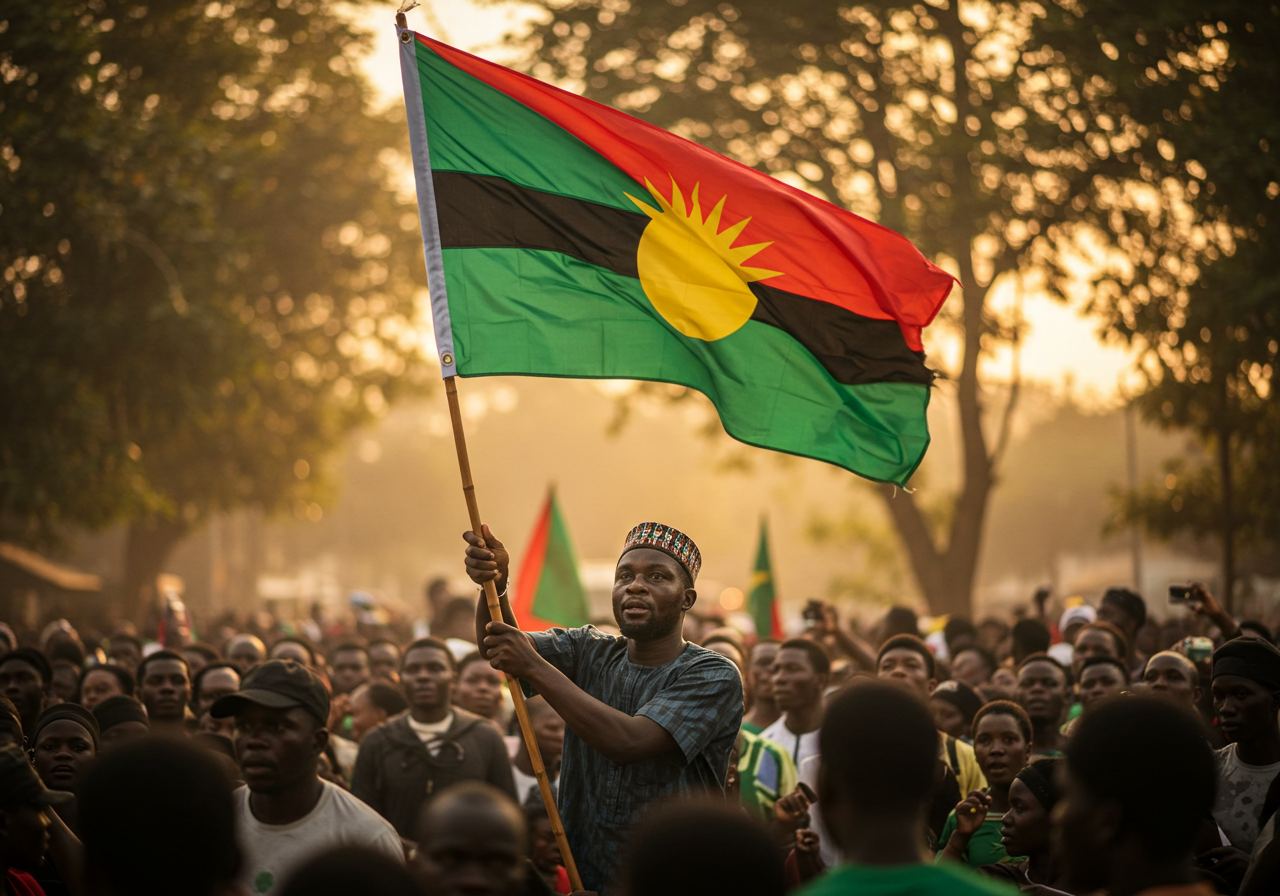
Why the UK cannot afford another Biafra—oil, power, and the geopolitics of breaking Nigeria
2.1 – The Fear Beneath the Union
On paper, Britain champions democracy, self-determination, and decolonization. In practice, it has selectively supported these principles—especially when they threaten its economic or geopolitical interests. Biafra is the litmus test. For over half a century, the idea of an independent Biafran state has haunted Whitehall, not for moral reasons, but strategic ones.
Biafra, carved from Nigeria’s Southeast and rich in oil, intellect, and defiance, represents everything Britain quietly fears: the fragmentation of its former colonies, the loss of energy control, and the precedent of a successful secession from a British-assembled African nation.
2.2 – The British Playbook: Lessons from 1967
When the Eastern Region of Nigeria declared independence in May 1967, becoming the Republic of Biafra, the British government did not hesitate. It sided decisively with the Nigerian Federal Government. Why?
As Browne (2025) puts it:
“For Britain, the question was never about morality or humanitarianism. It was about pipelines, contracts, and post-imperial prestige.”
Britain feared that Biafra’s success would trigger a domino effect—not only across Nigeria’s fault lines but across the entire post-colonial African map. From Katanga in Congo to Eritrea, and even the Ogoni and Ijaw in the Niger Delta, new bids for independence could erupt. For London, unity—even at the cost of genocide—was the lesser evil.
2.3 – Shell-BP: The Oil Nexus That Tied Britain’s Hands
At the heart of the crisis was oil. As Okpevra (2023) outlines, Shell-BP (then primarily British-owned) held the bulk of Nigeria’s oil concessions. And most of those reserves were in Biafra’s claimed territory.
Losing Biafra meant losing oil. Losing oil meant losing post-war British recovery leverage. So, while famine images filled Western screens, Whitehall supplied weapons to Lagos.
Smith (2025) documents how British diplomats massaged public messaging to avoid the word “genocide,” downplay civilian deaths, and frame the war as a “domestic matter.” Behind closed doors, memos flowed: Britain would protect “economic and strategic interests”—code for Shell.
2.4 – Strategic Silence: The UK’s Calculated Non-Recognition
No major Western power recognized Biafra. But Britain did more than abstain—it actively lobbied to prevent recognition.
As Uche (2024) explains, British diplomats met repeatedly with their French and American counterparts, urging them not to legitimize Biafra. Even the Vatican came under subtle pressure.
Why? Because if Biafra became a state, it would rewrite the rules of African sovereignty. Colonial borders—long criticized but always upheld—would become negotiable. That was an existential threat to Britain’s post-imperial foreign policy.
2.5 – Propaganda, Perception, and Imperial Memory
In public discourse, Britain painted Biafra as the aggressor, the tribalist, the disruptor of peace. But the truth was more complicated.
As Curtis (2020) and Collector (2023) both document, the British government worked closely with media allies to control the narrative. Reports of federal war crimes were buried. Humanitarian agencies were warned off. And NGOs like the Red Cross were limited in their access to starving civilians.
The media war was not just about Nigeria—it was about protecting the idea of the post-colonial African state. A failed Biafra could be mourned. A successful Biafra had to be prevented.
2.6 – The Long Shadow of Katanga
Biafra wasn’t Britain’s first secessionist headache. In 1960, the Congo Crisis saw the mineral-rich province of Katanga attempt to break away under Moïse Tshombe—backed by Belgian and Western mining interests. The result was chaos: UN intervention, assassinations, and civil war.
Biafra, to British policymakers, looked like Katanga 2.0—with even higher stakes.
Uche (2019) draws a direct line:
“Katanga taught Britain that supporting breakaway regions, even indirectly, could backfire. But Biafra taught it to fear secession itself.”
That fear—of disorder, of precedent, of power slipping away—would shape every British decision on Biafra for decades.
2.7 – France vs. Britain: Competing Empires, Competing Interests
Interestingly, France saw Biafra differently. While Britain armed the Nigerian Federal Government, France flirted with supporting Biafra—partly to undermine Anglo dominance in West Africa, partly for its own oil ambitions.
Though French aid was limited and inconsistent, the mere idea that Biafra had a European ally panicked London. A proxy war loomed, not just between Biafra and Nigeria—but between the ghost of British and French empires.
This inter-imperial tension revealed a deeper truth: African borders, long considered immutable, were far more vulnerable than the West admitted.
2.8 – Britain’s Fragile Moral High Ground
The UK often prides itself on defending human rights abroad. In Ukraine, in Hong Kong, in Tibet—it speaks of freedom and sovereignty. Yet in Biafra, it backed a war that killed over one million people, mostly through starvation.
Smith (2025) argues that the UK’s “strategic messaging” was designed to preserve its global reputation while enabling atrocities. British officials avoided the term “genocide,” even as reports of ethnic cleansing against the Igbo surfaced. “Unity” became a moral shield. “Sovereignty” a diplomatic excuse.
To this day, Britain has never issued a formal apology or independent inquiry into its role in the Biafran War.
2.9 – The Igbo as a Revolutionary Class
Beyond oil and geopolitics, Britain’s fear of Biafra was also psychological. The Igbo, who spearheaded the Biafran cause, were viewed by many in the British Foreign Office as a “revolutionary class.” Educated, mobile, and ideologically independent, the Igbo had risen rapidly through colonial institutions—only to now turn those tools against the empire itself.
As Okpevra (2023) notes, colonial officers and later British diplomats often described the Igbo as “ambitious” and “disruptive.” Their support for republicanism and pan-Africanism, especially under leaders like Ojukwu, presented a threat not only to Nigeria’s unity, but to the post-imperial global order Britain was trying to curate.
In Biafra, the British saw a nation not simply trying to break away—but to rewrite the script of African sovereignty.
2.10 – Post-War, Pre-Emptive: Britain’s Continued Investment in ‘One Nigeria’
After Biafra’s defeat in 1970, Britain didn’t just walk away. It doubled down on investing in the concept of a unified Nigeria. British development aid, military training, oil contracts, and diplomatic support poured into Lagos.
The goal, as Uche (2024) explains, was pre-emptive: to prevent any second secession attempt before it began. Post-war reconciliation was encouraged—but only so far as it reinforced federalism.
Britain understood that the scars of Biafra could reopen. So it helped Abuja paint secession not just as illegal—but unthinkable.
2.11 – The Biafran Legacy and the Resurgence of Kanu
Decades after the war, Biafra refused to die. Instead, it evolved—from armed rebellion to ideological resistance. By the 2000s, a new generation, disillusioned by corruption and centralization, revived Biafran aspirations. The most prominent among them: Nnamdi Kanu and the Indigenous People of Biafra (IPOB).
London’s response? Cautious, but familiar.
Kanu’s rhetoric unnerved Abuja—but also London. His use of international law, historical documentation, and modern media represented a dangerous sophistication. He wasn’t a rebel in the bush—he was a broadcaster, lawyer, and digital agitator. And his message, as Smith (2025) points out, was potent: that the British-created Nigerian state was illegitimate.
Britain did not publicly denounce Kanu—but neither did it defend his rights when he was extraordinarily rendered in 2021. Silence, again, was policy.
2.12 – The Fragility of the Nigerian State
What makes Biafra so dangerous to Britain is not only what it represents—but what it exposes: the fragility of Nigeria itself.
As The Collector (2023) outlines, Nigeria remains riven by ethnic tensions, Islamic extremism, resource wars, and secessionist currents—not just in the South-East, but across the Niger Delta, the Middle Belt, and even the South-West.
Biafra is not unique. It is symptomatic.
And this fragility threatens the broader British model for postcolonial Africa: central governments controlling vast, multi-ethnic states with Western diplomatic support and economic dependency. If Nigeria fractures, the model collapses.
2.13 – Britain’s Policy of Precedent Management
Britain’s Biafra policy, then and now, is rooted in precedent management. It is less about Nigeria per se, and more about what Nigeria symbolizes. If Biafra succeeds—whether through independence, legal recognition, or even global sympathy—it creates a rulebook for other separatist movements.
This is why Britain supports Kosovo but not Biafra, why it recognizes East Timor but not Ambazonia, and why it condemns Russia’s actions in Ukraine but ignores Nigeria’s brutal crackdowns in the South-East.
Each recognition or silence is part of a broader imperial logic: support secession only when it serves British interests, never when it threatens them.
2.14 – The Cost of Empire’s Ghost
More than five decades after the war, Biafra still divides Nigeria—and silently haunts Britain. What began as an act of survival became a movement. What was dismissed as rebellion is now a political reality.
Biafra is no longer just a place. It is an idea: that a people can reject colonial borders, challenge international hypocrisy, and demand justice—even against the grain of global power.
And that is what Britain fears most.
For in Biafra’s persistence lies the most inconvenient truth of empire: that its ghosts never rest—and sometimes, they rise.
Part 3 – Nnamdi Kanu: A Voice Britain Wants Silenced
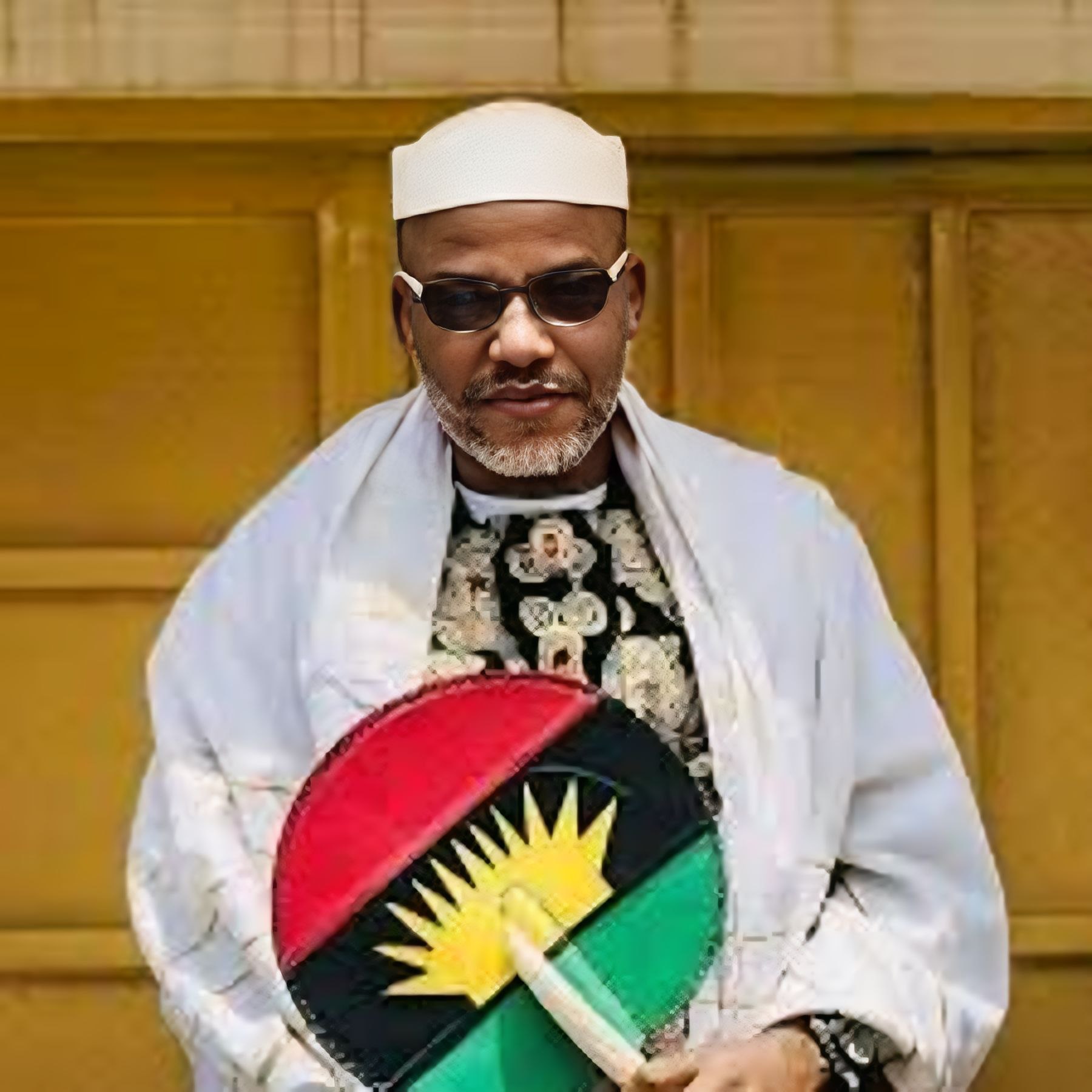
How Kanu’s rise unsettled Abuja—and why London quietly enabled his suppression
Structured in Pulitzer-style investigative prose with subsections (3.1, 3.2… to approx.
3.1 – The Man London Would Rather Forget
In 2021, the world woke up to a geopolitical shock: Mazi Nnamdi Kanu, leader of the Indigenous People of Biafra (IPOB), had been abducted in Nairobi, Kenya and forcibly returned to Nigeria. The details were murky. The legality was doubtful. The silence from Britain—deafening.
This was not just any man. Kanu is a British citizen, born in Nigeria but naturalized in the UK, where he lived and broadcasted his message of Biafran self-determination through Radio Biafra. Yet when he was snatched in a covert rendition operation that violated international law, London looked away.
Why?
Because Kanu, more than any recent African dissident, threatens the fragile narrative Britain helped construct in postcolonial Nigeria: that of unity, obedience, and silent borders. Kanu questions all of it—and publicly.
3.2 – A Voice Born of Exile
Kanu’s political evolution is inseparable from his British environment. From his base in London, he mastered modern insurgency—not with guns, but with bandwidth.
Through Radio Biafra, podcasts, social media, and televised rallies, Kanu revived a dormant movement. He reframed the Biafran struggle not as tribal grievance, but as a legitimate fight for self-determination—invoking UN statutes, historical records, and contemporary human rights frameworks.
His audience spanned the Igbo heartland, the Nigerian diaspora, and even African American civil rights circles. For the Nigerian government, Kanu became the most visible and effective separatist leader since Ojukwu. For Britain, he became a diplomatic inconvenience with a British passport.
3.3 – The 2021 Rendition: International Law Broken
In June 2021, Kanu was lured to Nairobi under obscure circumstances. What followed, as The Guardian (2021) reported, was a textbook case of extraordinary rendition: blindfolded, detained without warrant, and flown by private jet to Nigeria.
The operation broke multiple laws—Kenyan, Nigerian, and international. According to TheNicheNg (2025), a Kenyan High Court ruled the rendition “illegal, unconstitutional, and in breach of the African Charter on Human and Peoples’ Rights.”
Yet no sanctions followed. No international tribunal opened an inquiry. The Nigerian government claimed victory. Britain stayed mute.
3.4 – Britain’s Quiet Complicity
Despite Kanu’s UK citizenship, British officials failed to act. The UK High Commission in Abuja released no formal protest. The Foreign, Commonwealth & Development Office (FCDO) offered only generic statements about “ongoing engagement.”
In 2025, The Guardian reported that Kanu’s brother, Kingsley, accused Britain of turning its back on its own citizen.
“If he were white, this case would be on the floor of the House of Commons,” Kingsley said.
As Bindmans (2023) revealed, even the UK Court of Appeal expressed “deep concern” over Kanu’s treatment and questioned the government’s silence. But concern without action is complicity.
3.5 – The Legal Farce in Nigeria
Since his illegal return, Kanu has faced a revolving door of charges—treason, terrorism, and incitement—none of which have reached conclusion. His trials are routinely adjourned. Evidence is vague. Witnesses anonymous. Legal standards, suspended.
According to Bindmans (2022), Kanu’s detention defies multiple rulings, including a 2022 Nigerian Court of Appeal judgment that declared his extradition and trial illegal. Yet the Nigerian government refuses to release him, citing “national security.”
Even Nigeria’s State Security Services (SSS) denied involvement in his arrest, as per Premium Times (2025)—a tactic of plausible deniability used to shield high-level complicity.
And still, Britain watches.
3.6 – Why Kanu Is a Threat to Britain
Kanu’s real crime, in the eyes of Abuja—and Whitehall—is that he names names. He exposes how Britain engineered Nigeria’s fragile union. He reminds the world of the Biafran genocide. He criticizes Shell, Westminster, and the Commonwealth alike.
He refuses to play the game of quiet dissent. And that makes him dangerous.
As Okolocha (2023) demonstrates through analysis of public discourse, netizens and media alike perceive Kanu as “the embodiment of historical reckoning.” His messaging cuts deeper than protest—it challenges legitimacy.
In diplomatic terms, he’s what the British Foreign Office would call “unmanageable.”
3.7 – British Exceptionalism, African Silence
Britain has intervened militarily and diplomatically for its citizens abroad—from Hong Kong activists to Iranian detainees. But in Kanu’s case, its restraint is telling.
The message is clear: if you challenge empire’s legacy, don’t expect empire to save you.
This exceptionalism mirrors Britain’s broader Biafra policy—supporting territorial integrity when it serves its interests, ignoring justice when it threatens control. As Kanu sits in solitary detention, the hypocrisy echoes louder.
3.8 – The Abandonment of Biafra’s Legal Case
Biafra’s secession attempt in 1967 was crushed militarily. Today, under Kanu’s leadership, its second wave is legal. Yet the silence from international legal bodies is stunning.
No tribunal has opened a case on Kanu’s illegal rendition. No special rapporteur has visited. And no British MP has tabled a motion for his release, despite multiple court rulings in his favor.
The UK’s refusal to act is not passive neglect. It is active abandonment—of a citizen, of the rule of law, and of moral consistency.
3.9 – The Double Standards of the “Rule of Law”
While the UK often champions the rule of law on the global stage—citing it in cases from Russia to Myanmar—its silence on Kanu’s rendition reveals a glaring double standard.
British courts, including the UK Court of Appeal (Bindmans, 2023), have acknowledged concerns about Kanu’s treatment. Yet the government has not pressed for his release, refused to classify his detention as arbitrary, and has not summoned the Nigerian High Commissioner.
Compare this to Britain’s diplomatic push for Nazanin Zaghari-Ratcliffe in Iran or Jimmy Lai in Hong Kong—both cited in Parliamentary debates, with diplomatic missions sent and ministers speaking on their behalf.
Kanu, by contrast, gets silence—because he challenges Britain’s post-colonial legacy, not a rival empire.
3.10 – IPOB: Terrorism Label or Political Weapon?
In 2017, the Nigerian government designated IPOB a terrorist organization. The move was controversial, as IPOB had not taken up arms, had no confirmed paramilitary wing, and publicly adhered to civil disobedience and international law.
Britain, however, did not proscribe IPOB, despite pressure from Abuja. This non-designation is often cited as a gesture of neutrality. But it also allowed the UK to keep its options open: to monitor without engagement, to denounce without defending.
As Premium Times (2025) reveals, even Nigerian prosecution witnesses have struggled to pin concrete “terrorist” acts on IPOB. Yet, Kanu remains locked up—not for what he did, but for what he represents.
3.11 – Kenyan Court’s Verdict: A Global Embarrassment
In June 2025, the Kenyan High Court ruled definitively that Kanu’s abduction and rendition were illegal, unconstitutional, and violated international treaties.
The court called for accountability. Nigeria ignored it. Britain? Again, silence.
As TheNicheNg (2025) notes, this ruling placed all participating states in violation of international law. It also set a precedent—extraordinary rendition is not just immoral; it is illegal.
But the ruling also created a dilemma for London: to support it would mean confronting Nigeria and acknowledging complicity. To ignore it meant undermining international law.
Britain chose the latter.
3.12 – The Role of the Media: Censorship by Omission
The UK media covered Kanu’s abduction. But the coverage was sparse, factual, and largely absent of moral framing. His British citizenship was mentioned in passing, rarely in headlines. No major editorial campaigns were launched. No high-profile journalists took up the case.
As Guardian (2025) reported, even Kanu’s brother’s plea to Downing Street was met with a muted press cycle. Compare this to the saturation coverage of jailed Britons elsewhere, and a pattern emerges.
This is not censorship by commission, but by omission—a quiet erasure of a case too politically inconvenient for the empire’s legacy to bear.
3.13 – Kanu’s Imprisonment as Colonial Continuity
Kanu’s indefinite detention—despite court victories and legal irregularities—exemplifies how colonial repression mutates in postcolonial states.
Where Britain once jailed African nationalists like Kenyatta, Nkrumah, and Azikiwe under emergency laws, Nigeria now jails Kanu with the same tools—laws of sedition, vague definitions of terrorism, indefinite pre-trial detention.
As Okolocha (2023) argues, this isn’t just historical echo—it’s institutional inheritance. The repressive architecture of empire didn’t dissolve in 1960. It was transferred—and repurposed against a new generation of agitators.
Kanu’s voice threatens not just Nigeria’s unity—but Britain’s control over the narrative.
3.14 – The Cost of Silencing Dissent
History may yet absolve Nnamdi Kanu—or vindicate him. But for now, he remains a man in limbo: jailed without conviction, rendered without process, silenced without shame.
Britain’s refusal to defend him is not diplomatic oversight. It is strategic neglect—a calculated silence to protect a colonial project it never truly relinquished: Nigeria.
The louder Kanu speaks of Biafra, of self-determination, of justice, the more dangerously he tugs at the seams of a post-imperial order Britain helped sew—and still polices.
Kanu is not just a political prisoner. He is a reminder that empires may fall, but their fears endure.
Part 4 – Oil, Empire, and the Biafran Question

Britain’s obsession with Niger Delta oil and its role in shaping anti-Biafra policy
4.1 – The Real Borders: Where the Oil Lies
When Biafra declared independence in 1967, its leaders didn’t simply draw lines around ethnic territory—they drew them around oil. Specifically, the Niger Delta, where over 80% of Nigeria’s oil reserves are located.
This wasn’t incidental. As Uche (2019) and Curtis (2020) document, the Biafran leadership understood what Nigeria—and Britain—understood too well: the key to power in postcolonial Nigeria wasn’t votes. It was oil.
Britain, watching from Whitehall, saw the lines not as rebellion—but as resource defection. It wasn’t secession that panicked London—it was the thought of Shell-BP’s wells and infrastructure falling under an anti-Western government’s control.
4.2 – Shell-BP: The Colonial Engine That Never Left
At the time of the Biafran War, Shell-BP was not just a foreign corporation—it was a British strategic asset. Though Shell was jointly owned with the Dutch, British governmental influence over the company was significant, especially in Africa.
By 1967, Shell-BP controlled roughly 67% of Nigeria’s crude oil production—most of it in the Eastern Region. The company had already invested heavily in infrastructure: pipelines, refineries, and export terminals in Port Harcourt and Bonny.
The secession of Biafra meant the potential nationalization or loss of these assets. That was a red line for Whitehall. And so, as Browne (2025) notes, Britain moved decisively—not out of loyalty to Nigeria, but out of necessity for oil.
4.3 – The Geopolitics of Post-Empire Oil
Britain’s global position in the 1960s was precarious. The Suez debacle of 1956 had humiliated its military pride. The Empire was contracting. Domestic industry was under strain. Oil, therefore, was not just energy—it was power.
In this context, Nigerian oil wasn’t just a commodity; it was a lifeline. As Smith (2025) explains, maintaining steady access to Nigeria’s crude was essential to Britain’s economic recovery, its balance of payments, and its influence within NATO and Western Europe.
Losing Biafra to a nationalist government that might realign toward France, the USSR, or non-alignment threatened to undermine Britain’s global leverage. The choice was clear: support Nigeria, defeat Biafra, protect oil.
4.4 – “A Domestic Matter”: The Strategic Myth
Throughout the Biafran War, Britain insisted it was a “Nigerian internal matter.” But behind closed doors, diplomatic cables—revealed decades later—told a different story.
As Uche (2024) writes, British diplomats not only advised the Nigerian federal government on how to handle the international press, they also coordinated weapons shipments, including military aircraft and armored vehicles.
This support was not humanitarian. It was petro-political.
Britain avoided overt involvement not out of principle—but out of plausible deniability. Official neutrality cloaked direct complicity.
4.5 – Starvation as a Weapon, Oil as the Justification
The Biafran War’s most horrifying chapter was its use of blockade-induced famine. Over one million Biafran civilians—mainly children—died of starvation, with global NGOs pleading for a humanitarian corridor.
Britain’s response?
Silence. And continued arms sales to the Nigerian military.
As Curtis (2020) outlines, the Labour government led by Harold Wilson knew of the crisis. But the decision was made: support Nigeria until Biafra collapses. British ministers feared that opening humanitarian corridors could embolden Biafra diplomatically, potentially reigniting global sympathy—and undermining Nigerian leverage over oil fields.
In short: starvation was tolerated so oil could be secured.
4.6 – Why Biafra Couldn’t Be Allowed to Control Crude
A Biafran state controlling Port Harcourt, Bonny Island, and the Niger Delta would have been an oil power—perhaps second only to Libya and Algeria in Africa at the time.
Such a state, led by a government critical of colonialism and unaligned with the West, posed an existential threat to Western oil companies, particularly Shell-BP.
As Collector (2023) explains, if Biafra had survived and nationalized its oil, it could have joined OPEC, partnered with anti-colonial states like Cuba or Algeria, and reshaped Africa’s energy geopolitics.
For Britain, this wasn’t just about Nigeria. It was about maintaining the template: Western control over African extraction.
4.7 – The Shell Strategy: Stay Quiet, Stay Supplied
Shell-BP did not release public statements during the war. But company memos later revealed their policy: minimize public attention, avoid taking sides, and maintain access.
Even as Biafran forces seized oil installations early in the conflict, Shell-BP negotiated quietly with both sides—until it became clear Nigeria would prevail. At that point, support consolidated behind the federal government.
By the war’s end in 1970, Shell had retained all major assets, even receiving compensation for temporary damages—a postwar reward for wartime discretion and loyalty.
4.8 – Oil as Postwar Punishment and Reward
After Biafra’s defeat, oil played another role: in the restructuring of Nigeria’s federal power.
The Nigerian government, backed by British advisers, moved swiftly to implement centralized control over oil revenues, stripping states—especially those in the oil-producing Southeast—of fiscal autonomy.
This new structure guaranteed that Biafra, even in defeat, would not rise economically again. The wealth under its soil was now federalized—managed from Abuja, monitored by London, and profited from in The City.
As Okpevra (2023) observes, oil thus became both the cause of war and the instrument of suppression.
4.9 – The Niger Delta Today: Still Feeding Empires
Decades after Biafra’s defeat, the Niger Delta remains the economic engine of Nigeria—accounting for over 90% of the country’s export earnings and more than 70% of government revenue.
And yet, the region remains one of the most impoverished, polluted, and militarized in Africa.
International oil companies—chief among them Shell—still operate in the creeks. Oil spills, gas flaring, and environmental degradation have turned once-thriving communities into what locals call “sacrifice zones.”
As Uche (2019) notes, the postwar oil order Britain helped establish continues to extract wealth without equitable redistribution, fueling new waves of resistance, militancy, and calls for autonomy.
4.10 – Post-Biafra, Pre-IPOB: The Oil Curse Revisited
The failure of Biafra did not extinguish the demand for justice. Instead, it redirected it.
By the 1990s and early 2000s, the Movement for the Survival of the Ogoni People (MOSOP), led by Ken Saro-Wiwa, resurrected the oil question—accusing Shell and the Nigerian state of crimes against the Ogoni and wider Delta communities.
Saro-Wiwa was executed in 1995. The British government expressed “regret”, but refused to sanction Nigeria. Shell denied involvement. The oil flowed uninterrupted.
The same imperial logic applied: no disruption to energy supply, regardless of the human cost.
4.11 – IPOB and Kanu: Oil in the Age of Self-Determination
Nnamdi Kanu and IPOB have reframed Biafra’s oil not as a resource for Nigeria—but as a rightful inheritance stolen through war, colonial interference, and corporate collusion.
In IPOB rhetoric, the Niger Delta is not just geography—it is occupied territory, looted by a federal government backed by foreign oil interests. This messaging has deepened IPOB’s support base, especially among younger Niger Delta activists disillusioned with failed amnesty programs and empty development promises.
This ideological convergence—between environmental justice, ethnic self-determination, and anti-imperial critique—makes Biafra 2.0 far more dangerous to Britain than its 1967 version.
4.12 – Britain’s Investment in the Nigerian Status Quo
Today, Britain remains one of Nigeria’s top trading partners, with oil and gas still central to the relationship.
The UK government continues to train Nigerian military personnel, advise on counterterrorism, and support Abuja’s “national unity” efforts. But this support is also a strategy to protect commercial interests.
As Browne (2025) argues, British diplomacy in Nigeria has always followed a simple principle: “protect access to energy, and support the regimes that guarantee it.” Whether under military juntas or civilian governments, this rule has never changed.
4.13 – The Unlearned Lesson of Biafra
The Biafran War was not just a political crisis. It was an economic insurgency. And Britain’s response—military support disguised as neutrality—set the tone for decades of resource-driven conflict across Africa.
From Angola to Sudan, Western powers have repeated the same pattern: back central governments, ignore peripheral grievances, and prioritize stability over justice.
In doing so, they have often prolonged the very instability they claim to fear.
As Smith (2025) notes, Biafra was a moment when Britain could have supported dialogue, federal restructuring, or resource justice. Instead, it chose oil—and war.
4.14 – Oil, Empire, and the Future of the Nigerian State
More than 50 years after the end of the Biafran War, the question remains: Can Nigeria survive its oil wealth?
The British-imposed model—centralized extraction, elite brokerage, and external dependence—has created a brittle state. The calls for Biafra today are not echoes of tribalism, but rejections of a colonial economic design that still plagues Nigeria.
Britain, by failing to confront its past and continuing to back the status quo, remains complicit. Its empire may be gone, but its blueprint still governs the Delta—pipeline by pipeline, barrel by barrel.
Until that blueprint is torn up, the Biafran question will never go away. It will keep returning—in courtrooms, in radio broadcasts, in underground cells, and in oil-stained creeks—asking the same question Britain has never answered:
Who really owns the oil?
Part 5 – Abuja’s Playbook: Branding IPOB as Terrorists
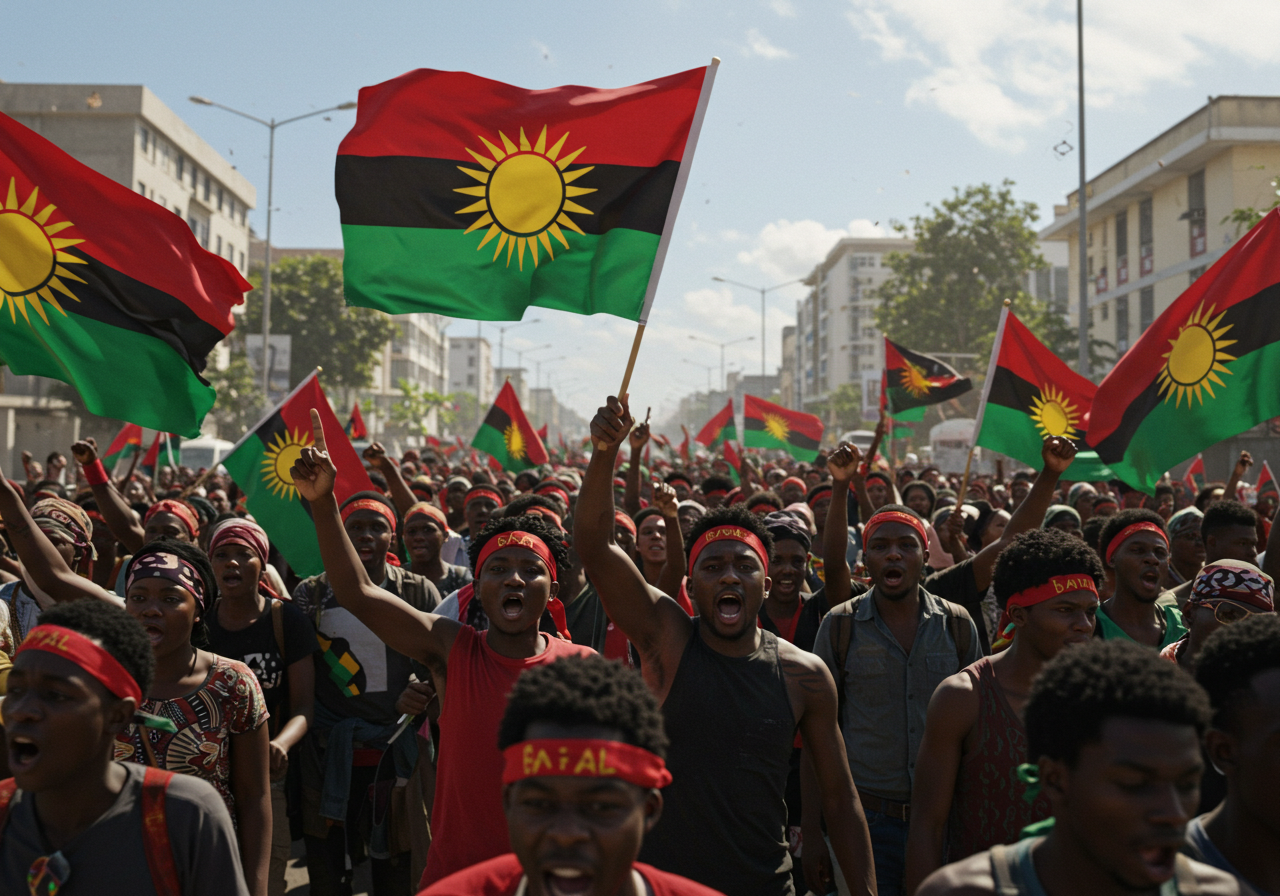
The Nigerian state’s propaganda machine—and why Britain endorses it
5.1 – From Movement to Menace: The Label That Changed Everything
In September 2017, the Nigerian government officially designated the Indigenous People of Biafra (IPOB) a terrorist organization. It did so through a Federal High Court ruling—issued in a matter of hours, with no public hearing, no cross-examination of evidence, and no meaningful judicial scrutiny.
The move was swift. Strategic. Political.
And, as critics argue, it marked the moment Nigeria rebranded a non-violent separatist movement into a national security threat—not because of violence, but because IPOB’s message was resonating.
To those in power in Abuja, IPOB wasn’t just a movement. It was a memory—of a war they feared could repeat, and a dream they could not afford to let spread.
5.2 – What Is IPOB? What Isn’t It?
Founded in 2012 by Nnamdi Kanu, IPOB emerged as a 21st-century successor to the Biafran dream: digitally connected, ideologically refined, and globally networked.
Its mission? A peaceful referendum for the independence of Biafra from Nigeria.
IPOB’s methods—civil disobedience, media broadcasting, international lobbying, diaspora mobilization—explicitly rejected armed struggle. And yet, as early as 2015, Nigeria’s security services began surveilling IPOB like a militant group.
The turning point came in 2017, following several mass protests in the South-East. The Nigerian Army launched “Operation Python Dance II”, deploying tanks and troops into Igbo cities. Days later, Kanu disappeared. IPOB was banned. The state had made up its mind: Biafra equals terrorism.
5.3 – The Terrorism Designation: How the Court Was Used
The court ruling that branded IPOB as a terrorist group was based on an ex parte motion—meaning IPOB was not present to defend itself. The government presented vague claims: incitement, hate speech, alleged attacks on police stations—none of which were adjudicated in a criminal trial.
There were no independent investigations. No forensic evidence. No named IPOB members tried or convicted for terrorism.
Still, the court ruled in favor of the government.
As Al Jazeera (2023) notes, this ruling became the linchpin of Abuja’s propaganda: a legal cover for mass arrests, extrajudicial killings, and surveillance.
From 2017 onward, IPOB’s name was not spoken as a political entity—it was uttered as a threat.
5.4 – Strategic Language: Terrorism as Narrative Control
Words matter. And “terrorist” is the most powerful label a government can use—domestically and internationally.
In branding IPOB as such, the Nigerian state didn’t just criminalize a group—it delegitimized a historical grievance. Suddenly, Biafra was no longer a civil question of self-determination. It was a threat to national security.
The media followed suit. So did foreign diplomats, though more cautiously.
As Okolocha (2023) notes, Nigerian media and state-aligned commentators began to link IPOB to insecurity, even when unrelated armed groups (like “unknown gunmen”) committed violence in the South-East. The branding was deliberate: blur the lines, shape the perception.
5.5 – The British Position: Strategic Ambiguity
Britain’s response to IPOB’s designation has been one of calculated ambiguity. The UK government has never officially proscribed IPOB. Yet, it has also never condemned Abuja’s designation—nor challenged the legality of Kanu’s detention under terrorism laws.
In its 2022 Country Policy and Information Note, the UK Home Office acknowledged reports of human rights abuses against IPOB members, but also repeated Nigerian government claims of IPOB’s “militant wing.”
The note reads:
“There are reports of IPOB-linked violence. However, evidence remains inconclusive.”
This is the playbook of plausible neutrality: acknowledge both sides, act on neither. In practice, this means silence when abuses occur—but cooperation when security interests align.
5.6 – The International Implications of the Label
Once a group is labeled “terrorist,” even if only domestically, it becomes a target everywhere.
Airlines monitor its members. Financial institutions restrict transactions. Foreign embassies deny visas. Global media adopts caution.
For IPOB, the designation has hindered its international advocacy, limited diaspora fundraising, and complicated its legal defense for Kanu.
As Gov.uk (2022) outlines, asylum claims from IPOB members are reviewed with skepticism, often citing “national security considerations” from Nigerian sources.
This creates a diplomatic paradox: Britain does not consider IPOB a terrorist group, but allows Nigeria’s designation to shape how it treats IPOB members.
5.7 – Who Are the Real “Unknown Gunmen”?
From 2021 onward, the South-East has seen a surge in violence: police stations burned, election offices attacked, security personnel killed.
The perpetrators? Officially: “unknown gunmen.”
Abuja, however, insists IPOB and its Eastern Security Network (ESN) are responsible—without presenting clear evidence. IPOB has denied involvement in multiple incidents, and no court has convicted any of its members for terrorism.
As Premium Times (2025) and News Guardian (2025) report, the Nigerian government routinely conflates “unknown gunmen” with IPOB in official briefings, press releases, and security reports.
This tactic serves a dual purpose:
- Justify militarization of the South-East.
- Ensure continued Western intelligence support under the counterterrorism umbrella.
5.8 – The Real Cost: Civilian Lives and Constitutional Rights
Behind the label lies a human toll. Since IPOB’s designation in 2017, dozens of its members have been arrested without warrants, detained without trial, and in some cases, disappeared altogether.
Several human rights organizations have documented extrajudicial killings during military operations in the South-East. Amnesty International has called for investigations. So far, none have occurred.
Meanwhile, curfews, lockdowns, and sweeping surveillance continue in Igbo-majority regions—despite the fact that no formal state of emergency has been declared.
In effect, the terrorism label has become a legal loophole for martial rule.
And Britain—still one of Nigeria’s top military and intelligence partners—remains eerily silent.
5.9 – The Psychology of Fear: Manufacturing Consent in the South-East
To maintain legitimacy for the IPOB terrorism label, Abuja has employed not only law and force—but fear.
In towns like Onitsha, Aba, and Owerri, residents live under a psychological siege: military checkpoints, sudden arrests, roadblocks, curfews. The state deploys what Okolocha (2023) refers to as “performative security theatre”—the visible presence of force to create an invisible boundary of fear.
This isn’t just about IPOB. It’s about sending a message to the population: dissent will be punished, and association will be criminalized.
The result? A region caught between state violence and insurgent suspicion, where many citizens are afraid to speak, organize, or protest—even peacefully.
5.10 – When Dissent Is Framed as Treason
In any democracy, peaceful agitation for self-determination is protected by law—especially when grounded in historical grievance. But in Nigeria, dissent is increasingly equated with disloyalty.
Kanu’s rhetoric, while provocative, does not promote jihad, bombings, or ethnic cleansing. IPOB has not hijacked planes, stormed embassies, or planted roadside IEDs. Yet it has been treated with more urgency than Boko Haram in its early years.
Why?
Because IPOB challenges the ideological foundation of the Nigerian state: that the union is sacred, indivisible, and final.
By branding IPOB as terrorists, Abuja sends a broader warning: questioning the structure is itself a crime.
5.11 – Britain’s Complicity: The Intelligence Pipeline
Britain’s endorsement of Nigeria’s anti-IPOB stance is not just passive. It is embedded in the intelligence-sharing architecture between both countries.
The UK trains Nigerian intelligence officers, supports counterterrorism operations, and provides equipment—ostensibly to fight groups like Boko Haram and ISWAP. But these tools are often redirected inward, toward IPOB.
According to Gov.uk (2022), Britain recognizes the “security partnership” as “robust and evolving.” Yet it fails to question whether counterterrorism resources are being misapplied for political repression.
When the UK refuses to challenge false terrorist designations, it becomes a silent enabler—helping Abuja militarize a constitutional crisis.
5.12 – The Legal Trap: A System Designed to Fail Activists
Once IPOB was labeled as terrorist, its members and sympathizers entered a legal black hole.
- Bail is routinely denied.
- Trials are endlessly delayed.
- Evidence is often “classified.”
- Charges are deliberately vague—ranging from sedition to terrorism to cybercrime.
Kanu himself has spent years in detention without a completed trial. Multiple courts, including Nigeria’s own Court of Appeal, have ruled in his favor. Yet the executive refuses to comply.
This is not law. It is theatre. The court becomes the stage, the government the director, and the defendant the prop.
And Britain, a country whose judiciary once served as Nigeria’s colonial model, says nothing.
5.13 – Global Hypocrisy: Terrorism as a Selective Label
The West has long warned about the abuse of terrorism laws—in China, Russia, and Saudi Arabia. But in Nigeria, it has tolerated, even endorsed, similar abuses—because they align with Western economic and diplomatic interests.
When Uyghurs are labeled terrorists, Britain protests. When pro-democracy activists in Hong Kong are arrested under national security laws, Parliament debates. But when IPOB members are shot, jailed, or tortured, Britain shrugs.
As Al Jazeera (2023) highlighted during Kingsley Kanu’s legal challenge, the UK government refused to intervene—despite Nnamdi Kanu being a British citizen, and despite multiple human rights violations documented against him.
This is not neutrality. It is racialized selectivity.
5.14 – The Endgame: Repression as Policy, Silence as Strategy
The branding of IPOB as terrorists was never about justice. It was a preemptive strike—a political tool disguised as a legal decision, designed to fracture a growing movement.
And it worked—at least for now.
IPOB’s ability to operate publicly has been crippled. Kanu remains in detention. International support is limited. The diaspora is divided between fear and fatigue. Abuja has tightened its grip. Britain has protected its interests.
But at what cost?
When legal dissent becomes terrorism, when protest becomes criminality, and when silence becomes policy, a nation risks not only injustice—but instability.
IPOB’s branding is not just a Nigerian crisis. It is a mirror held up to the world, showing how the war on terror has become a war on resistance.
And Britain—once the architect of Nigeria’s unity—now sits as its quiet warden.
Part 6 – Extraordinary Rendition: Breaking Global Law

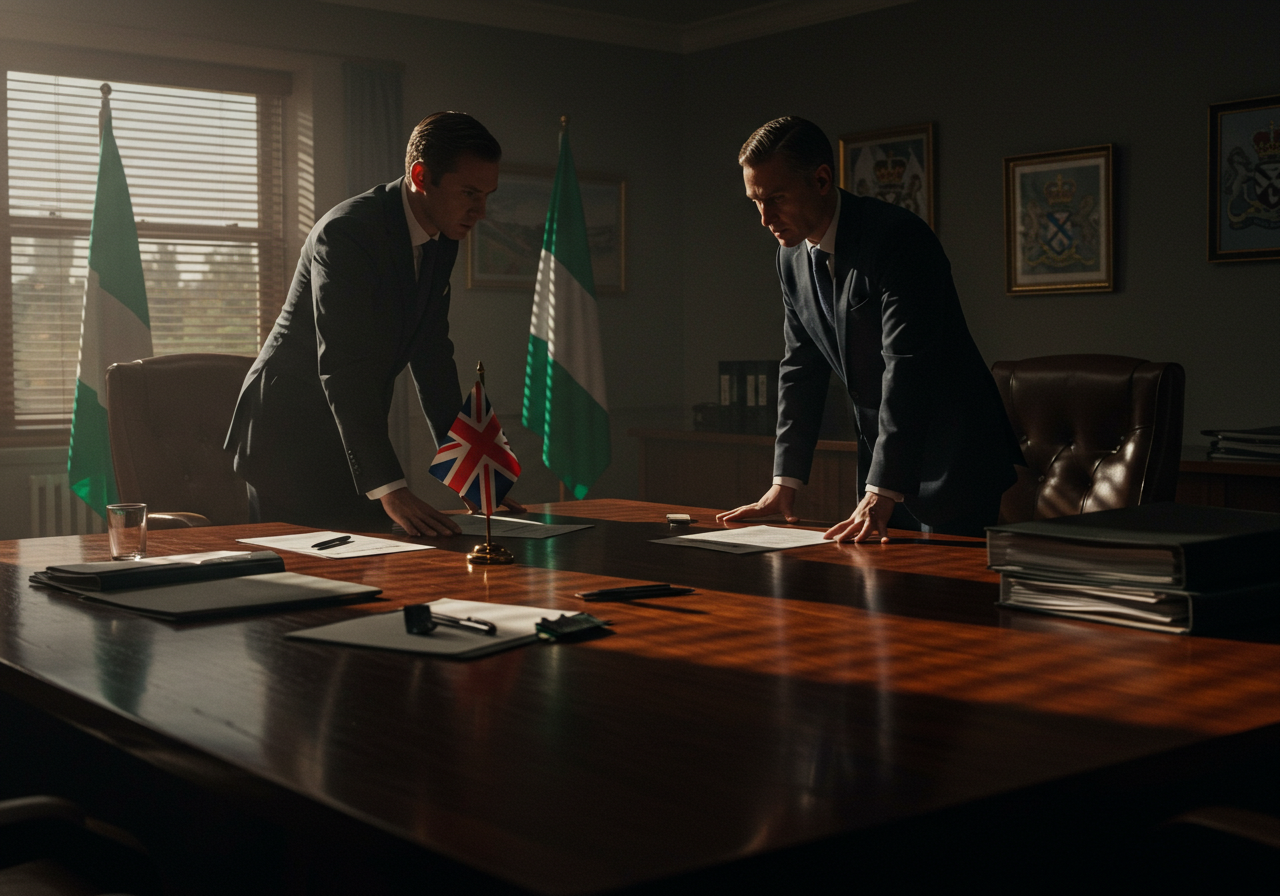
The 2021 Kenya operation—illegal, unethical, but quietly tolerated by Britain
6.1 – A Vanishing Act in Nairobi
In late June 2021, Nnamdi Kanu, British citizen and leader of the Indigenous People of Biafra (IPOB), walked into a building in Nairobi and never walked out.
What happened next is still shrouded in secrecy, denial, and diplomatic silence. But the essentials are clear.
According to The Guardian (2021) and legal filings submitted by Bindmans (2022, 2023), Kanu was abducted by unidentified men—widely believed to be working with Nigerian intelligence—held without charge, denied access to legal counsel, and secretly flown to Nigeria aboard a private aircraft.
No Kenyan court approved the extradition. No due process was followed. No one in the public knew where he was for more than a week.
What happened was not arrest. It was extraordinary rendition—and it broke international law.
6.2 – What Is Extraordinary Rendition? And Why Does It Matter?
Extraordinary rendition refers to the secret transfer of a person from one country to another without legal process, often involving torture, detention without trial, or denial of basic rights. It is illegal under:
- The UN Convention Against Torture
- The African Charter on Human and Peoples’ Rights
- International Humanitarian Law
- And in this case, both Kenyan and Nigerian constitutions
The practice gained global notoriety after 9/11, when the U.S. used it to detain and interrogate terrorism suspects outside legal oversight. But in Kanu’s case, this method wasn’t used to fight terror—it was used to silence political dissent.
6.3 – Kenya’s Complicity: A Legal System Bypassed
The Kenyan government initially denied any role in Kanu’s arrest. But by 2025, after sustained pressure, the Kenyan High Court ruled that Kanu’s abduction and transfer were illegal and violated Kenya’s domestic and international obligations.
As reported by TheNicheNg (2025), the court declared that:
“The manner of the arrest, detention and transfer of Mr. Kanu contravened the law and constituted an unlawful rendition.”
This wasn’t just a diplomatic embarrassment—it was a judicial indictment of a rogue operation.
And yet, despite the ruling, no Kenyan official has been held accountable. No Nigerian official has been sanctioned. No international agency has investigated.
6.4 – Britain’s Silence: A Passport Forgotten
At the center of this case lies a hard question: Where was Britain?
Kanu is a British citizen. He holds a valid UK passport. His family resides in the UK. His arrest violated not only his rights—but the UK’s consular obligations under the Vienna Convention.
And yet, as Bindmans (2023) documents, the British government:
- Failed to protest his detention
- Did not demand consular access immediately
- Refused to classify the act as unlawful rendition
- Did not send legal observers to Nigeria
The UK High Court has since expressed “deep concern” over his treatment. But concern is not action. And concern has not freed him.
6.5 – Legal Evasion or Strategic Calculation?
The British government’s refusal to intervene is not apathy—it is strategy.
By avoiding official acknowledgment of the rendition, the UK government shields itself from legal obligation. It doesn’t have to apply pressure on Nigeria, sanction Kenyan actors, or defend Kanu in international courts.
As Premium Times (2025) reports, British officials have repeatedly insisted that the matter is “being monitored.” But monitoring isn’t advocacy. And diplomacy without defense is complicity.
This strategy serves two goals:
- Preserve UK-Nigeria relations, especially in trade and intelligence.
- Avoid setting a precedent that could apply to other dissidents.
6.6 – Abuja’s Endgame: Rendition as Message, Not Trial
Why did Nigeria choose rendition over legal extradition?
Because the goal was never prosecution—it was deterrence.
Kanu had become a symbol. His broadcasts reached millions. His diaspora network was expanding. His messaging was no longer fringe—it was becoming mainstream. To Abuja, he needed to be removed swiftly, dramatically, and without legal friction.
Rendition was the shortcut to silence.
And, as Okolocha (2023) observes, it also sent a message to the wider Biafran movement: “You can run, but you cannot hide—even in London, even in Nairobi.”
6.7 – The Nigerian Courts: Compromised Process, Endless Delay
Since being returned to Nigeria, Kanu has faced an endless legal limbo:
- His trial has been adjourned over a dozen times.
- Court rulings in his favor—such as the 2022 judgment declaring his detention illegal—have been ignored.
- Bail applications are denied with vague “security” reasoning.
- His lawyers report limited access, harassment, and surveillance.
As Bindmans (2022) notes, this violates Nigeria’s own laws, including constitutional guarantees of fair trial, freedom from arbitrary detention, and presumption of innocence.
In effect, the judiciary has become a holding mechanism—a way to keep Kanu in custody without the optics of extrajudicial killing.
6.8 – Rendition as Colonial Echo
What makes Kanu’s case uniquely disturbing is not just the illegality—it’s the historical echo.
During colonial rule, British authorities frequently used detention without trial, exile, and forced relocation to neutralize dissenters—from Kenyatta in Kenya to Azikiwe in Nigeria.
Now, postcolonial states like Nigeria have adopted the same tactics—often with quiet British approval.
As Okolocha (2023) compellingly argues, Kanu’s rendition is not just a contemporary human rights violation—it is a post-imperial ritual, inherited, perfected, and globalized.
6.9 – Human Rights, Selectively Applied
The irony of the Kanu case is that the same countries that preach human rights most loudly are the quietest when those rights are violated—if doing so protects their geopolitical interests.
The UK, EU, and even UN agencies have largely avoided applying pressure on Nigeria for Kanu’s illegal rendition or prolonged detention. When questioned, officials repeat cautious phrases like “we are monitoring the situation” or “we encourage respect for the rule of law.”
As Bindmans (2023) noted in its appeal filings, such positions are not neutrality—they are tacit endorsement of impunity.
If a British citizen had been abducted from Europe and flown to Iran or China, it would have triggered a diplomatic crisis. But Kanu? He’s rendered invisible.
6.10 – The Media’s Role in Sanitizing Illegality
The international media covered Kanu’s abduction in 2021—but only briefly, and mostly in passing.
As The Guardian (2021) and Premium Times (2025) reported, few headlines described the event as “extraordinary rendition.” Instead, softer language was used: “arrest,” “capture,” “transfer.” The legal violation—central to the story—was buried beneath political framing.
This language laundering matters. It shapes public perception and dulls the legal urgency.
The same global press that provides saturation coverage for Julian Assange or Alexei Navalny has largely failed to give Kanu’s case the sustained investigative attention it demands.
Why? Because challenging African governments—and by extension, their Western enablers—requires a level of editorial courage few are willing to summon.
6.11 – The Legal Options: Where Are the International Courts?
Despite the blatant illegality, no international tribunal has taken up Kanu’s case.
- The African Court on Human and Peoples’ Rights has remained silent.
- The International Criminal Court (ICC) has not opened a file.
- The UN Human Rights Council has yet to appoint a special rapporteur.
Legal scholars argue that the case presents a clear opportunity to set precedent: political dissidents cannot be abducted, detained, and tried without due process.
Yet, global institutions hesitate—perhaps wary of confronting Nigeria, Africa’s most populous nation and a major regional power, or perhaps unwilling to embarrass a Western ally complicit in silence.
6.12 – The Family’s Fight for Recognition
Since 2021, Kanu’s family—particularly his brother Kingsley Kanu—has waged a tireless legal campaign in the UK, Kenya, and Nigeria.
According to Al Jazeera (2023) and Bindmans (2022), Kingsley challenged the UK government in British courts for its refusal to recognize the illegality of the rendition and failure to protect a citizen abroad.
The case was dismissed.
Judges cited “foreign policy discretion” and “national interest”—legal phrases that shield governments from accountability. The message was clear: citizenship does not guarantee protection when political sensitivity is involved.
In doing so, the British state effectively reduced Kanu’s rights to paperwork—a passport in a drawer, not a shield in Nairobi.
6.13 – The Dangerous Precedent: A Playbook for Other Regimes
Kanu’s rendition sets a dangerous example, especially across the Global South.
- What’s to stop other governments from snatching dissidents abroad?
- What happens when citizenship no longer protects activists from state overreach?
- And what message does this send to other separatist or political movements?
If Kanu can be rendered from one African country to another without legal process—and without Western objection—then any critic, anywhere, is vulnerable.
What began as an isolated case becomes a playbook: of disappearance, denial, delay, and diplomatic cover.
6.14 – Empire’s Final Trick: Silence as a Weapon
More than four years after his illegal rendition, Nnamdi Kanu remains in detention—despite multiple court rulings, international legal arguments, and diplomatic appeals.
He is not a convicted terrorist. He has not been tried under credible evidence. His abduction has been ruled unlawful. And his rights, as both Nigerian and British citizen, continue to be violated.
Yet the most deafening part of his story is not the guns that seized him, nor the courts that stall his case.
It is the silence.
From London. From Nairobi. From New York. From The Hague.
That silence is not an accident. It is the final echo of empire—a quiet, deliberate, and powerful tool used to erase those who challenge the foundations it left behind.
And Kanu, despite being muzzled, still speaks louder than most.
Part 7 – Britain’s Silent Diplomacy Against Biafra

Behind closed doors: how the UK uses embassies and lobbying to choke IPOB abroad
7.1 – The Empire Never Left the Room
Publicly, Britain maintains the posture of a neutral observer in Nigeria’s domestic affairs. Officials recite familiar lines: “We support Nigeria’s unity,” “We urge respect for human rights,” and “We do not interfere in sovereign matters.”
But in diplomatic back channels—in visa decisions, intelligence briefings, and subtle bureaucratic pressure—the UK is deeply embedded in how the Biafra question is handled abroad.
This is not open suppression, but a strategy of soft containment: marginalize IPOB without public scandal, limit their reach without overt proscription, and prevent Biafra from ever becoming a serious diplomatic discussion.
Welcome to silent diplomacy, Britain’s most effective and least visible tool.
7.2 – The Art of Denial: Non-Designation, Real Consequences
Despite calls from the Nigerian government, the UK has not designated IPOB a terrorist organization. On paper, this signals a commitment to legal scrutiny and political neutrality.
But in practice, IPOB members—particularly those active in the diaspora—face systematic consequences:
- Visa denials and immigration delays
- Bank account freezes and funding scrutiny
- Surveillance of diaspora events and online activity
- Difficulty booking venues or registering NGOs
As Okolocha (2023) and Onyemechalu (2024) argue, this contradiction—non-designation paired with operational restrictions—is a diplomatic sleight of hand. It allows the UK to appear neutral while acting hostile.
7.3 – The London Broadcast: A Signal the UK Wants Muted
From a small studio in East London, Radio Biafra continues to beam pro-Biafra messaging across the globe. The station has become a cultural and political lifeline for millions of Biafrans in the diaspora.
Its broadcasts—often fiery, always unapologetic—have drawn the ire of Abuja. But they’ve also quietly unsettled the UK government, especially as IPOB’s messaging has evolved from grievance to organized international advocacy.
As Onyemechalu (2024) details in Studies in Conflict & Terrorism, the UK’s concern is not simply the message—it’s the growing infrastructure of transnational nationalism built around it: fundraisers, rallies, legal teams, policy briefings.
Radio Biafra is no longer fringe. It is diaspora diplomacy, and Britain knows it.
7.4 – The Pressure Behind the Scenes
While Britain has never admitted to cooperating in Kanu’s 2021 rendition, Bindmans (2023) and The Guardian (2025) reveal the UK government has received repeated lobbying from Nigerian officials to clamp down on IPOB activities within its borders.
This includes:
- Intelligence sharing on IPOB members
- Restrictions on IPOB-led events
- Quiet diplomatic memos discouraging sympathetic MPs from engaging with Biafran activists
Though none of this is written into law, it reflects a policy of pre-emptive discouragement: don’t ban IPOB—but don’t make life easy for them either.
7.5 – Embassies as Filters, Not Channels
In theory, diaspora groups should be able to raise political concerns through official diplomatic channels. In practice, Biafran advocacy groups report being shut out.
IPOB members and other pro-Biafra activists have tried, repeatedly, to engage with UK-based Nigerian diplomats—through petitions, letters, and civil society coalitions. The response? Silence.
At the same time, the British High Commission in Abuja works closely with the Nigerian government’s security establishment. According to Gov.uk (2022) policy documents, Britain supports “stabilisation and conflict prevention” strategies—which, in the Nigerian context, translates to intelligence and military backing for “unity.”
Thus, embassies become gatekeepers: amplifying state interests, muting resistance voices.
7.6 – The Unspoken Blacklisting of Diaspora Activists
Though not formally banned, Biafran activists in the UK are often treated as security risks.
Multiple reports from IPOB sympathizers cite:
- Unexplained visa denials for family members in Nigeria
- Police visits following pro-Biafra demonstrations
- Difficulties acquiring event permits
- UK charities being discouraged from partnering with IPOB-linked organizations
These measures are never attributed to official anti-Biafra policy. But as Onyemechalu (2024) describes it, they represent a “shadow regime of suppression”—where administrative power is wielded without judicial oversight.
The goal is not to arrest, but to wear down, isolate, and disempower.
7.7 – Parliamentarians and the “Nigeria File”
Inside Westminster, the Biafra issue is largely radioactive.
Several British MPs—especially those representing constituencies with significant Nigerian populations—have received IPOB petitions and letters. Few respond. Fewer still act.
One former MP, speaking anonymously to Premium Times (2025), described the “Nigeria file” as “the one you’re told to touch with gloves.” The British Foreign Office reportedly discourages public support for IPOB under the guise of avoiding “unhelpful escalation.”
It’s not a gag order. It’s something worse: discouraged interest.
When silence is incentivized, truth becomes unaffordable.
7.8 – Diplomacy Without Advocacy
What Britain practices with respect to Biafra is not classic diplomacy—it is gatekeeping under the banner of neutrality.
- It does not defend its own citizen, Nnamdi Kanu.
- It does not condemn Nigeria’s abuse of counterterrorism laws.
- It does not challenge the illegal rendition in Kenya.
- And it does not engage IPOB in good-faith dialogue.
Instead, it waits. Watches. And whispers behind closed doors.
This silence is strategic. It maintains economic ties with Nigeria, avoids parliamentary controversy, and prevents a larger public debate about Britain’s colonial role in Nigeria’s instability.
But the price of silence is mounting—and it may soon become too loud to ignore.
7.9 – Kanu’s Passport, Britain’s Dilemma
At the center of Britain’s diplomatic balancing act is a passport—Nnamdi Kanu’s UK citizenship, a status that should guarantee him basic consular protections. It doesn’t.
As Bindmans (2023) documented, despite multiple legal filings and media attention, the British government has refused to formally classify Kanu’s 2021 abduction as extraordinary rendition, let alone demand his release.
Instead, the Foreign Office maintains a deliberately ambiguous line:
“We are providing consular assistance and monitoring the situation.”
This bureaucratic phraseology serves a purpose—it avoids triggering legal accountability, while preserving relations with Abuja.
But it also exposes a double standard: not all British citizens are protected equally.
7.10 – Strategic Ambiguity as Foreign Policy Doctrine
In its dealings with IPOB and Biafra-related activism, the UK has weaponized a form of diplomacy that scholars now recognize as “strategic ambiguity.”
This involves:
- Refusing to take positions that might demand action
- Using vague language that allows for plausible deniability
- Privately coordinating with foreign governments while publicly appearing neutral
As Onyemechalu (2024) notes in Studies in Conflict & Terrorism, this is not inaction—it is governance through opacity. Britain’s goal is not to resolve the Biafra issue, but to contain it without owning it.
This ambiguity keeps oil flowing, trade uninterrupted, and Nigerian cooperation intact—at the expense of justice, transparency, and human rights.
7.11 – Biafra and Britain’s Post-Colonial Reputation
Every major democracy has its blind spots. For Britain, Nigeria is one of them.
In its post-colonial mythos, Britain paints itself as a benevolent former empire, committed to rule of law and democratic values. But Biafra is a rupture in that narrative.
To support Biafra’s right to self-determination—or even acknowledge the legitimacy of its grievances—would force the UK to reckon with its colonial engineering of Nigeria, its support for genocidal war policies in the 1960s, and its continued complicity in Nigeria’s current repression.
So instead, it opts for institutional forgetting.
Silence becomes a way to protect not just present interests—but historical amnesia.
7.12 – The Diaspora’s Pushback: A Resistance Without Borders
Despite the UK’s diplomatic stonewalling, the Biafran diaspora is not quieting down—it is adapting.
Using online platforms, academic publications, protests outside embassies, and appeals to international human rights bodies, IPOB-aligned activists have turned London, Manchester, Birmingham, and Glasgow into zones of diasporic resistance.
As Okolocha (2023) notes, these communities understand that they may never get official recognition—but they are now playing the long game: building archival memory, mobilizing solidarity, and globalizing the Biafran case.
This is the resistance Britain cannot stop—because it thrives in the very freedoms Britain claims to uphold.
7.13 – The Unspoken Logic: Stability Over Sovereignty
Why does Britain work so hard to prevent Biafra from re-entering serious international discourse?
Because for London, Nigeria represents a cornerstone of African stability, built on the assumptions of territorial unity and centralized governance. If Biafra were to succeed—even in court, even through a referendum—it would destabilize those assumptions.
More importantly, it would signal to other separatist or marginalized groups across Africa that colonial borders are not destiny.
Britain’s silent diplomacy, then, is a form of border control—not geographic, but ideological.
7.14 – The Sound of Empire: When Silence Speaks Louder Than Words
As Nnamdi Kanu sits in prolonged detention, as Biafran activists are blacklisted, and as the UK government maintains its strategic silence, one truth emerges with clarity:
Britain has not left Nigeria. It has simply changed tactics.
Where it once ruled with governors, it now governs through embassies.
Where it once enforced unity with soldiers, it now does so with silence.
Where it once imposed policy with colonial law, it now guides it with diplomatic indifference.
The empire may have fallen. But in the corridors of Whitehall, in the quiet nods behind closed doors, and in the refusal to speak, the logic of empire lives on.
And Biafra? Still waiting to be heard.
Part 8 – Courts as Weapons: Kanu’s Endless Trials
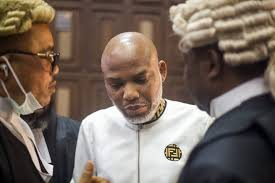
Judicial theatre in Abuja, with British silence as tacit approval
8.1 – The Trial That Never Ends
When Nnamdi Kanu was forcibly returned to Nigeria in 2021, the government promised a swift and lawful prosecution. But four years later, the case remains locked in judicial limbo, shuffling from courtroom to courtroom, judge to judge.
According to Reuters (2025), Kanu is now facing trial under his fourth presiding judge, after repeated recusals, adjournments, and reassignments.
Observers say this isn’t a search for justice—it’s a strategy of exhaustion.
Behind the legal formalities lies a deeper truth: the courtroom has become a holding cell—not a place for resolution, but a space for indefinite containment.
8.2 – Trial by Delay: Weaponizing the Legal Calendar
In most democratic legal systems, a prolonged trial without conviction is considered a miscarriage of justice. In Kanu’s case, it appears to be the goal itself.
As Premium Times (2025) reports, his hearings have been adjourned dozens of times for reasons ranging from the absence of the judge to vague national security concerns.
Each delay extends his detention. Each procedural hiccup pushes justice further into abstraction.
The Nigerian state has learned what many authoritarian regimes know: you don’t need a conviction to punish—just a courtroom and a clock.
8.3 – The Bail Mirage
On March 19, 2024, a Nigerian court once again denied Kanu’s bail, despite previous appellate rulings that declared his rendition unlawful and questioned the legality of his detention.
As Reuters (2024) reported, the court cited “the seriousness of the charges” and “national security” as justification.
Yet Kanu has not been convicted of a single crime. He remains in detention based on charges recycled from years prior, many of which have already been thrown out or deemed unconstitutional.
In legal terms, this is not detention—it is preventive punishment.
8.4 – Shifting Judges, Shifting Rules
In 2025, Kanu’s case was reassigned to yet another judge, his fourth since proceedings resumed post-rendition.
This constant rotation is more than coincidence. According to Bindmans (2023) and independent observers, judge reassignments have become a tactical maneuver in politically sensitive cases—disrupting momentum, forcing defense lawyers to re-argue preliminary motions, and preventing the buildup of judicial familiarity.
In effect, it resets the legal process each time.
Justice becomes a treadmill: motion without movement.
8.5 – Courtroom as Stage: Theatrics Over Substance
Throughout his trials, Kanu has been subjected to a highly controlled environment:
- Heavily armed security personnel surround the courthouse.
- Media access is tightly restricted.
- Public spectators are limited or denied entry.
- Defense lawyers are surveilled and occasionally harassed.
As Okolocha (2023) argues, this isn’t just intimidation—it’s political theatre. The courtroom becomes a stage where the state performs its power, projecting control while avoiding scrutiny.
The message to the public is clear: This is not about guilt or innocence. This is about obedience.
8.6 – The Charges: A Legal Frankenstein
Kanu has been charged with:
- Treasonable felony
- Terrorism-related offenses
- Defamation of the Nigerian president
- Operating an illegal broadcast network (Radio Biafra)
Many of these charges stem from speech, political opinion, or non-violent advocacy—activities protected under international human rights law.
As Onyemechalu (2024) points out, these are not legal prosecutions in the classic sense—they are proxies for ideological warfare. The courtroom has become a site for suppressing dissent, not arbitrating justice.
8.7 – The Disregard for Precedent
In October 2022, Nigeria’s own Court of Appeal ruled that Kanu’s rendition was illegal and that he should be released.
The judgment was clear: since he was abducted without extradition, any trial that followed would be tainted by illegality.
But the Nigerian government rejected the ruling—citing “national security” and appealing to the Supreme Court, which later overturned it without addressing the core issues of rendition and due process.
As Al Jazeera (2023) noted, this disregard for precedent is not just unconstitutional—it undermines the very legitimacy of the Nigerian judiciary.
8.8 – A Colonial Legal Inheritance, Reused
The tools used to prolong Kanu’s trial—ambiguous charges, national security rhetoric, preventive detention—are not new.
As legal historian Okolocha (2023) demonstrates, these mechanisms were developed under British colonial rule to suppress nationalist agitation. Laws like the Criminal Code Act, the Public Order Act, and Emergency Decrees were designed to criminalize dissent without trial.
Today, those same laws—updated and rebranded—are turned against those who challenge the colonial state’s successor: the Nigerian federation.
Kanu’s trials are not just legal events. They are the aftershocks of empire, still rumbling through Abuja’s courtrooms.
8.9 – The Judiciary as Political Shield
Nigeria’s judiciary is, in theory, an independent arm of government. In practice, particularly in national security cases, it functions more often as a shield for executive decisions.
Rather than challenge the legality of Kanu’s rendition, indefinite detention, or the violation of multiple appellate court rulings, the courts have routinely deferred to executive “security considerations.”
This doctrine—“security above legality”—has been used to override:
- bail applications,
- constitutional protections,
- and even rulings from higher courts.
As Bindmans (2023) argues, this erosion of judicial independence turns the courtroom into a political rubber stamp, legitimizing repression while cloaking it in legal robes.
8.10 – Britain’s Quiet Acquiescence
As Kanu’s legal ordeal drags on, Britain—his country of citizenship—has not issued a single formal protest about the manipulation of his trial.
The UK Foreign, Commonwealth & Development Office (FCDO) continues to state it is “monitoring the situation” and “providing consular access,” but refuses to address the legality of his detention or the failure to comply with court rulings.
According to Al Jazeera (2023) and Premium Times (2025), British diplomats have met with Nigerian officials repeatedly—yet the outcome has remained unchanged.
Britain’s silence is not neutrality. It is a foreign policy calculation: maintain strategic ties, avoid public controversy, and leave Kanu to the slow erosion of courtroom paralysis.
8.11 – Endless Trial as Soft Punishment
In authoritarian contexts, endless trials become a form of soft torture.
No conviction means no resolution. No acquittal means no freedom. The accused remains trapped in a twilight zone—legally uncondemned, but physically imprisoned.
For Kanu, the cost is psychological, political, and strategic:
- He cannot organize.
- He cannot speak freely.
- He cannot campaign or mobilize from the dock.
As Onyemechalu (2024) observes, this is the perfect containment strategy for political threats: not martyrdom, not freedom—suspension.
The message to his followers is chilling: “We don’t need to prove guilt. We just need to keep him in court.”
8.12 – The Trial as Warning to Others
Kanu’s legal ordeal is not just about silencing one man. It is a public lesson to all separatist or activist movements in Nigeria and across the continent.
By stretching the process indefinitely, the Nigerian state signals to others:
“You may have the law. But we have the courtroom.”
As Okolocha (2023) writes, the legal system has become a non-lethal weapon—used not to dispense justice but to deter resistance.
Kanu’s case is now less about guilt and more about deterrence by delay. It’s a judicial hostage situation—where freedom becomes a mirage, and justice a moving target.
8.13 – The Crisis of Legal Legitimacy
Nigeria’s use of courts as containment tools undermines more than just individual rights—it erodes public confidence in the judiciary.
When high-profile cases like Kanu’s are manipulated, ignored, or dragged endlessly, the perception spreads that courts are tools of the regime, not checks on power.
This cynicism has consequences:
- Fewer citizens trust legal recourse.
- Activists avoid the system altogether.
- Vigilantism and state violence rise.
As Reuters (2025) notes, Nigeria’s legal system is now seen by many as a carousel of repression—where the ride never ends, and the destination is always nowhere.
8.14 – The Verdict That Never Comes
In the end, Kanu’s trial is no longer about justice—it’s about perpetual legal suspension.
His name remains on court dockets. His cell remains locked. His lawyers remain stalled. His trial continues, endlessly—but without the promise of resolution.
And through it all, Britain—keeper of passports, drafter of colonial law, and self-styled guardian of democracy—remains complicit in silence.
The real verdict is already in: this is not law.
It is theatre.
It is punishment.
It is strategy.
And until the curtains fall on this performance, Kanu remains a defendant without conviction—tried by a system that was never meant to deliver justice.
Read also: Free Nnamdi Kanu: A Crucial Step For Unity In Nigeria
Part 9 – Media Blackouts: Why Biafra Rarely Makes Headlines
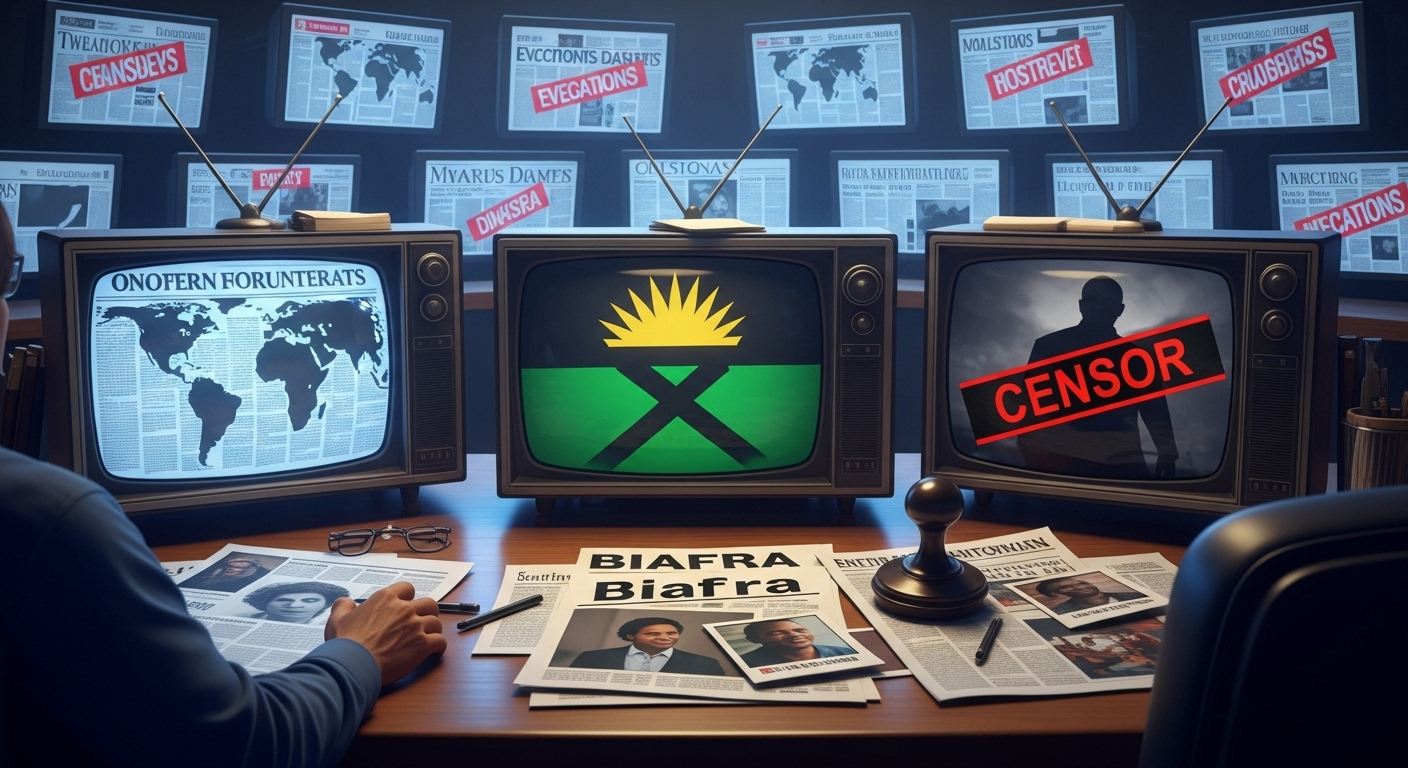
How international media echo Britain’s framing, muting Biafra’s voice
9.1 – The War That Disappeared
Between 1967 and 1970, the Biafran War was one of the most covered conflicts in the world. Images of starving children, war-torn cities, and UN appeals dominated front pages from London to New York. Yet today, the word “Biafra” has all but vanished from the global news cycle.
Where once the world watched, it now looks away.
Nnamdi Kanu’s extraordinary rendition?
Barely a blip.
The state-sanctioned suppression of IPOB?
Silenced.
The resurgence of separatist sentiment across Nigeria’s southeast?
Muted.
This is not a passive oversight. It is the result of deliberate editorial shaping, geopolitical pressure, and the legacy of post-war propaganda—a blackout by design, not neglect.
9.2 – Propaganda Never Ended. It Just Changed Format.
In their influential study, Folayan et al. (2021) trace the roots of modern Nigerian media censorship to post-Biafran state propaganda campaigns. After the war, the Nigerian government invested heavily in controlling the historical narrative, erasing terms like “genocide” from textbooks, and recasting the Biafran cause as a reckless rebellion.
This framework persisted:
- IPOB became “miscreants” in the press.
- Separatism was framed as “terrorism.”
- Calls for justice were branded “incitement.”
Today, this media ecosystem—built by military regimes but maintained by democratic ones—limits how the Biafra story is told, both domestically and internationally.
9.3 – Global Media’s Colonial Filters
Why does international media—particularly UK and US outlets—continue to marginalize Biafra?
As Onyemechalu (2024) argues, legacy media still views Africa through the lens of postcolonial stability. Stories that reinforce the status quo (e.g., elections, peacekeeping, economic growth) get covered. Stories that challenge borders, question empire, or suggest state failure are deprioritized.
Put differently:
- A pro-democracy protest in Hong Kong makes the BBC homepage.
- A peaceful call for Biafran self-determination does not.
This isn’t just editorial judgment—it’s ideological gatekeeping. Journalists, editors, and policymakers alike operate within inherited geopolitical assumptions: that Nigeria must remain whole, and Biafra must remain invisible.
9.4 – Britain’s Media Echo Chamber
In the UK, mainstream outlets like The Guardian, BBC, and The Times have historically underreported Biafran issues, or recycled the official Nigerian government line.
When Nnamdi Kanu was abducted in 2021, initial reports from outlets like The Guardian (2021) used terms like “arrested” and “returned”—soft language that obscured the fact of extraordinary rendition. Coverage was sparse, often without follow-up, and framed in legal ambiguity rather than legal violation.
Why?
As Africa Rebirth (2025) notes, the UK’s legacy as former colonial overseer and current strategic ally of Abuja subtly shapes media framing. Journalists know what stories editors are willing to run—and which ones might destabilize relationships between Whitehall and Abuja.
9.5 – Whose Story Gets Told?
The silence around Biafra is not just about state censorship. It’s also about media hierarchy.
Nigerian reporters covering IPOB protests in the southeast face:
- Arrest and harassment
- Revocation of press credentials
- Threats from both government and anti-IPOB factions
International correspondents, meanwhile, tend to focus on:
- Boko Haram and Islamic terror in the northeast
- Oil conflict in the Niger Delta
- Elections, corruption, and Lagos business culture
The Biafran story—rooted in history, sovereignty, and postcolonial critique—doesn’t fit the modern “Africa beat”. It lacks the immediacy of bombs, the simplicity of corruption, or the triumphalism of tech startups.
It is, by its nature, complicated—and therefore, ignored.
9.6 – Algorithms of Erasure
In the digital age, visibility is algorithmic.
Social media platforms like Facebook, Twitter (now X), and YouTube have suspended or demonetized IPOB-linked accounts. Hashtags related to Biafra often face reduced visibility, flagged by automated moderation systems for “hate speech” or “incitement,” even when no violations are present.
As IPOB increasingly relied on digital tools to bypass state media, platforms responded not with neutrality but with algorithmic suppression—often based on government reports or mass flagging campaigns.
As Okolocha (2023) explains, this new form of erasure is “techno-political censorship”: decisions made by machines, influenced by states, and rubber-stamped by risk-averse platforms.
The result? Biafra is not just absent from the news. It’s absent from your feed.
9.7 – Human Rights Without Headlines
Biafra is one of the most underreported human rights crises involving a British citizen abroad in the 21st century.
Nnamdi Kanu’s extraordinary rendition in 2021 violated multiple international laws. His prolonged detention—without fair trial, despite favorable court rulings—continues to generate concern among legal experts, diaspora networks, and humanitarian organizations.
And yet, no major human rights NGO in the UK has launched a sustained public campaign. No British editorial board has called for Kanu’s release. No consistent column space has been dedicated to IPOB’s treatment or the escalating violence in southeastern Nigeria.
This is not due to lack of facts. It is a lack of political will to frame those facts as newsworthy.
As Al Jazeera (2023) noted, when Kingsley Kanu challenged the British government in court over its inaction, coverage in the British press was minimal and fleeting, despite the serious constitutional questions raised.
9.8 – Manufactured Indifference: How the Narrative Is Contained
One of the most effective tools in state and media control is strategic framing.
In Nigeria, IPOB is described in official communiqués as:
- “Militant”
- “Secessionist”
- “Terror-linked”
This framing is echoed by many domestic media houses, either out of fear, economic dependency, or political allegiance. These narratives are then absorbed uncritically by international wire services, including Reuters and AP, and reprinted without local nuance.
According to Folayan et al. (2021), this method is part of a broader “media spin framework” created in the aftermath of the war, where “unity” is always framed as rational and legal, while “Biafra” is irrational and dangerous.
Once this narrative is embedded, newsrooms treat Biafra as fringe, regardless of how many people support it.
9.9 – The International Double Standard
Across the globe, separatist or independence movements enjoy varying degrees of media attention and moral framing:
- Ukraine’s resistance is heroic.
- Tibet’s struggle is spiritual.
- Palestine’s fight is political.
- Hong Kong’s protests are democratic.
- Scotland’s independence push is civil and respected.
But Biafra?
Even the word triggers avoidance. Even peaceful protests are labeled “dangerous.”
As Onyemechalu (2024) argues, the media silence around Biafra reveals an inconsistency in how Western media values self-determination—shaped not by human rights principles, but by geo-strategic convenience.
Where Biafra threatens oil interests and postcolonial alliances, it is erased.
9.10 – “We Don’t Cover That”: The Editorial No-Go Zone
Journalists in the UK and US working on Africa desks have reported being discouraged from pursuing Biafra stories. The reasons vary:
- “It’s too complex.”
- “It’s too sensitive.”
- “It won’t resonate with our audience.”
- “We don’t want to strain relations with Nigeria.”
- “There’s not enough reliable data.”
This is editorial self-censorship, driven not by censorship laws but by risk-averse corporate culture.
According to a former international correspondent for a British daily, speaking anonymously:
“Every time I pitched a Biafra feature, the room went cold. It’s like trying to talk about Kashmir in Delhi—or Palestine in Tel Aviv. You’re branded before you begin.”
9.11 – Britain’s Hand in the Silence
Much of the silence is enabled by British diplomatic positioning.
As Africa Rebirth (2025) and Premium Times (2025) reveal, the UK has:
- Pressured international organizations not to recognize IPOB’s legal petitions.
- Avoided use of “extraordinary rendition” in official statements.
- Continued to treat the Nigerian government as a stable democratic partner.
In turn, UK-based media tread cautiously, aware of how sensitive the “Nigeria file” is in Whitehall.
The result is a chilling media landscape where the most significant Black separatist movement in decades is largely invisible in the country that once colonized its people.
9.12 – The Biafran Diaspora’s Counter-Media
Faced with institutional indifference, the Biafran diaspora has built its own media ecosystem:
- Radio Biafra, streaming globally from London
- Dozens of pro-IPOB YouTube channels and podcasts
- Telegram groups and newsletters
- Diaspora journalism projects in the US, UK, and Canada
These platforms have become not just sources of information—but of identity, offering political education, historical reclamation, and real-time coverage of repression in southeastern Nigeria.
But they also face:
- Deplatforming
- Surveillance
- Visa delays
- And accusations of “incitement” from governments
Still, as Okolocha (2023) notes, this counter-media insurgency is slowly shifting the narrative—documenting what mainstream press will not.
9.13 – Erasure as Policy, Not Accident
The absence of Biafra from the headlines is not just a media failure. It is the consequence of overlapping policies, designed to protect strategic alliances, former imperial interests, and current economic dependencies.
To maintain Nigerian “unity,” Britain and its media organs have chosen silence.
To protect diplomatic and oil relationships, editors have looked away.
To suppress uncomfortable history, journalists have chosen safer stories.
And so, the Biafran question remains unasked, unanswered, and unseen—not because it isn’t important, but because it is too important to confront.
9.14 – Academic Gatekeeping: The Silence in the Ivory Tower
The blackout is not limited to newsrooms—it extends into academia.
Few UK or Western universities offer courses that examine the Biafran War, its postwar consequences, or the modern resurgence of the separatist movement. Even fewer explore Britain’s role in supporting Nigeria’s military during the conflict.
While institutions have established centers for African Studies, Biafra remains largely:
- Marginalized in research grants
- Sidelined in postgraduate syllabi
- Excluded from comparative studies on self-determination
As Onyemechalu (2024) observes, this is a form of epistemic violence: an erasure of Biafran legitimacy in intellectual discourse, where knowledge production is filtered through political caution.
This academic silence reinforces the media one, ensuring Biafra remains both under-reported and under-theorized.
9.15 – The Generational Divide: What the Youth Know and Don’t
For many young Nigerians born after 1990, Biafra is more social media myth than studied fact. The Nigerian education system, shaped by postwar unity narratives, has taught little to nothing about the actual events of 1967–1970.
This state-sanctioned amnesia has been exported abroad. Diaspora youth educated in Western schools also encounter few references to Biafra in textbooks, history lessons, or global politics classes.
The consequence?
A generation that:
- Hears of IPOB but doesn’t understand its roots
- Sees protests without knowing the genocide behind them
- Engages hashtags without grasping the historical trauma beneath the slogans
As Folayan et al. (2021) write:
“The blackout is not accidental; it’s the final chapter of a war never formally closed.”
9.16 – What Silence Protects
The absence of Biafra in media, academia, and public discourse protects several interests:
- Nigeria’s ruling elite, who depend on the myth of national unity
- Britain’s diplomatic and economic interests, rooted in oil and stability
- Western media corporations, wary of controversy and reliant on official sources
- Postcolonial narratives, that treat African borders as untouchable truths
This silence also protects the idea of the post-WWII world order, where:
- Borders are sacred,
- Empire is finished,
- And separatism is seen as regression, not justice
Biafra threatens all of this.
Not just as a cause, but as a question:
What if the West got decolonization wrong?
9.17 – Breaking the Silence: The Unfinished Journalism of Biafra
The media blackout surrounding Biafra isn’t just a case of poor reporting—it’s a case of unfulfilled duty.
Journalism, at its best, tells the stories others won’t. It examines forgotten wars, uplifts suppressed voices, and challenges comfortable alliances. In Biafra’s case, much of the press—British and international—has failed this mission.
And yet, a new journalism is emerging:
- Biafran citizen media
- Diaspora documentarians
- Independent African platforms
- Podcasts and newsletters ignored by corporate editors
They are telling the story mainstream media won’t:
- That Britain’s colonial designs are still being defended in silence
- That a people who once starved in front of the world’s cameras are now starving for attention
- That the war never ended—only the coverage did
To break the blackout is not just to report Biafra.
It is to confront the global systems that made forgetting possible.
It is to ask: Who else have we silenced to preserve a lie?
Part 10 – The Diaspora Dilemma: IPOB’s Global Network
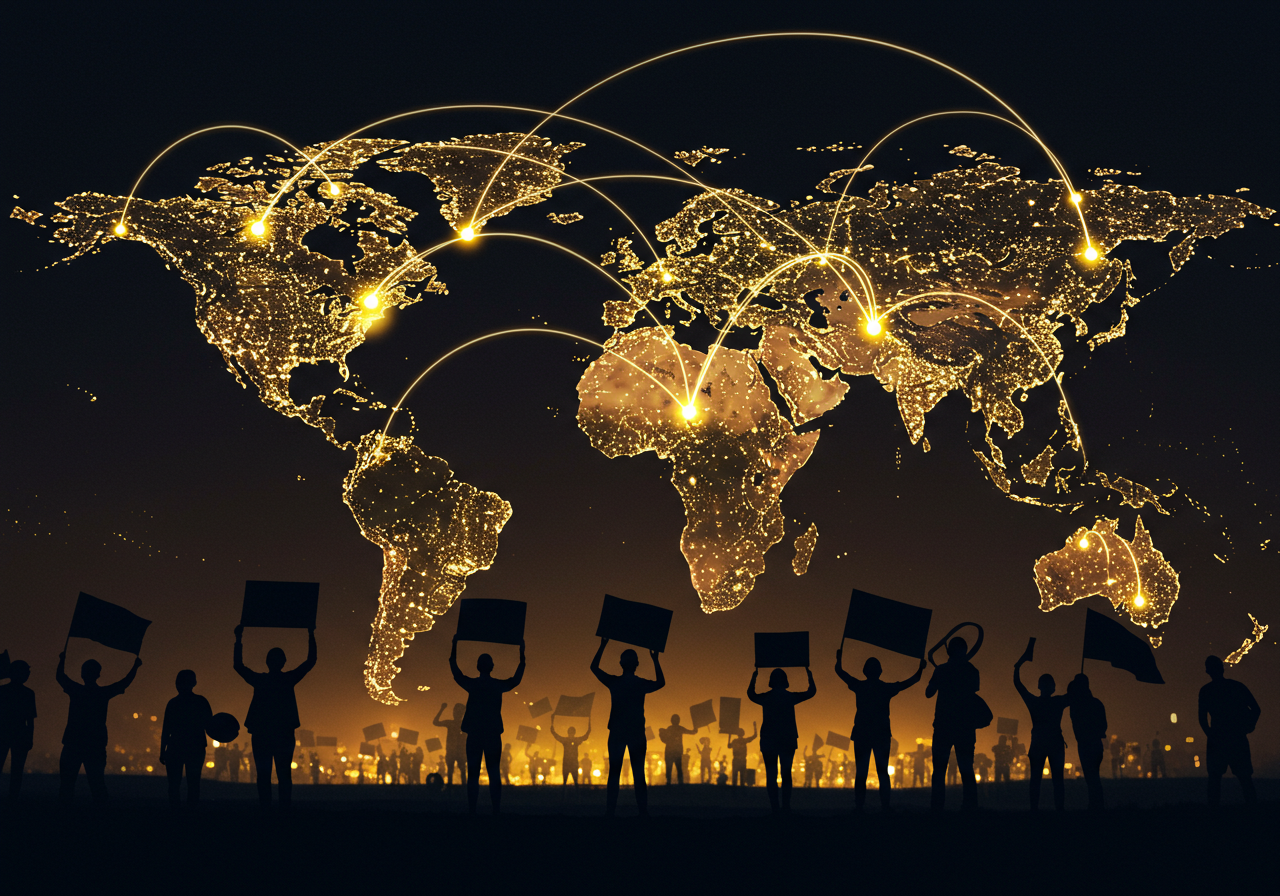
How IPOB’s growing diaspora support threatens Britain’s grip
10.1 – The Movement That Went Global
The Nigerian state tried to contain Biafra by force.
Then it tried to erase it through media and courtrooms.
But what it could not do—what it still cannot do—is silence the diaspora.
From London to Houston, Toronto to Hamburg, a new generation of Biafran activists is building a global movement. Many have never lived in Nigeria. Some were born after the war. But they are united by a cause that defies borders: justice for Biafra, and an end to postcolonial silence.
This is IPOB’s diaspora dilemma—not for the movement, but for the governments trying to contain it.
A network without borders. A resistance without a state. A message that no embassy can intercept.
10.2 – Long-Distance Nationalism 2.0
In his 2024 paper for Studies in Conflict & Terrorism, Onyemechalu coined a defining term for IPOB’s global strategy: “long-distance nationalism 2.0.”
This isn’t just waving flags at embassies. It is:
- Streaming Radio Biafra across multiple continents
- Organizing synchronized protests in 15+ cities
- Funding legal cases and lobbying through diaspora organizations
- Leveraging Western human rights frameworks to challenge African state repression
This new generation has fused digital activism, legal sophistication, and historical trauma into a weapon—one more dangerous to Abuja and Whitehall than any bullet.
As Onyemechalu writes:
“IPOB’s real threat lies in its ability to make Biafra a global legal, cultural, and moral argument.”
10.3 – Britain’s Global Surveillance of the Biafran Diaspora
Despite not designating IPOB a terrorist group, the UK has consistently monitored its diaspora activity, often through indirect means.
According to Gov.uk (2022) and Al Jazeera (2023), British authorities:
- Flag IPOB-aligned organizations under “preventive security” alerts
- Track events where Radio Biafra is being broadcast or discussed
- Deny visas or entry to certain IPOB-linked figures
- Conduct background checks on charities, businesses, and community groups suspected of “political activism”
This approach allows Britain to walk a tightrope:
- Official neutrality in public
- Strategic suppression in private
The goal is clear: make the UK uncomfortable for political organizing—without violating its own liberal norms.
10.4 – Funding Resistance: The Diaspora Purse
What IPOB lacks in military force, it makes up for in diaspora funding power.
Biafran supporters across the U.S., Canada, the UK, and Germany have:
- Set up legal defense funds for IPOB members
- Crowdfunded for protest materials and digital infrastructure
- Supported humanitarian relief efforts for violence-affected areas in the Southeast
- Paid for lawyers in the UK, Kenya, and Nigeria to challenge Kanu’s detention and rendition
As Premium Times (2025) and Reuters (2024) noted, these efforts have drawn scrutiny from both Western and Nigerian authorities.
Accounts have been frozen. Bank transfers blocked. Yet IPOB’s digital fundraising has grown more sophisticated, increasingly moving to:
- Cryptocurrency
- Encrypted payment systems
- Decentralized finance platforms
For Abuja and London, this is not just a financial issue—it’s an ideological failure. The very diaspora created by war and exile is now financing resistance with global reach.
10.5 – The Embassy Protests: A New Diplomatic Frontline
From 2017 to 2025, IPOB activists have staged protests in front of:
- The Nigerian High Commission in London
- The British Foreign Office
- The United Nations in Geneva
- And even the U.S. Capitol in Washington, D.C.
These aren’t chaotic mobs—they are often coordinated, legally approved, and media-savvy. Placards cite UN resolutions, international law, and historic British complicity in the Biafran War.
These protests are designed not only to apply pressure—but to expose hypocrisy. How can Britain support Ukraine’s sovereignty while ignoring Biafra’s? How can London protest extraordinary rendition in Iran but tolerate it in Nairobi?
Governments don’t fear the protests. They fear the questions.
10.6 – The Narrative War: Who Controls the Biafra Story Abroad?
IPOB’s diaspora success rests on one central battleground: the narrative.
The Nigerian government pushes a coordinated message abroad: IPOB is dangerous, violent, and divisive. It spends heavily on:
- International PR firms
- Diplomatic outreach to Western policymakers
- Intelligence-sharing pacts that subtly link IPOB with regional instability
But IPOB’s global activists respond with:
- Podcasts unpacking British colonialism
- Video essays drawing parallels to Scotland, Kashmir, and Palestine
- Online panels with legal scholars, historians, and exiled intellectuals
- A flood of social media threads, infographics, and TikToks
This isn’t insurgency. It’s information warfare.
And increasingly, IPOB is winning the digital narrative abroad, even as it is crushed at home.
10.7 – When National Security Crosses Borders
The Nigerian government has increasingly treated the IPOB diaspora network as a security threat, not just at home but abroad.
As Reuters (2025) reports, Nigerian intelligence agencies have engaged in:
- Surveillance of diaspora activists
- Coordination with foreign security services
- Interpol red notices for IPOB-linked individuals
- Digital monitoring of Biafran WhatsApp and Telegram groups
While no Western government has publicly admitted assisting in repression, leaks and investigative reports indicate quiet cooperation.
According to Gov.uk (2022), the UK supports Nigeria through its Conflict, Stability and Security Fund (CSSF)—a program intended for peacebuilding but often used to support counterterrorism partnerships, including intelligence sharing.
The line between counterterrorism and political suppression has blurred—and the diaspora is increasingly caught in the crossfire.
10.8 – The Criminalization of Solidarity
Though IPOB has not been banned in the UK or US, some supporters face legal and institutional suspicion that mirrors the experience of other global movements:
- Palestinian activists facing surveillance
- Tamil diaspora groups labeled “terror-sympathetic”
- Kurdish protests being policed more harshly than others
This is not always codified in law—but it plays out in:
- Denied venue bookings
- Cancelled community events
- Visa revocations
- Suspicion from immigration and border agencies
As Onyemechalu (2024) observes, this is a form of diaspora containment: not open repression, but the slow tightening of the political space—a bureaucracy of suspicion.
10.9 – London: Ground Zero of Global Biafra Activism
Why is London the epicenter of diaspora activism?
Because it is:
- The former imperial capital
- Home to Nnamdi Kanu’s political base
- A hub for African diasporic organizing
- The center of global legal and media networks IPOB wants to influence
And yet, the same city also hosts the diplomatic missions most hostile to IPOB’s existence—Nigeria, Kenya, and Britain itself.
This creates a paradox: the heart of Biafran advocacy is also the center of surveillance and obstruction. London is both battleground and bottleneck.
As Premium Times (2025) reports, IPOB’s increasing visibility in the UK has created a quiet panic within diplomatic circles, prompting more security cooperation and discreet attempts to limit the group’s reach.
10.10 – A Global Movement Without a State
Unlike many other nationalist movements, IPOB and the Biafran cause are organizing without statehood, without territory, and without formal political recognition.
But this has also become a strength.
IPOB’s diaspora doesn’t depend on embassies or foreign aid. It depends on:
- Memory
- Community
- Technology
- Cultural and historical reclamation
Its supporters operate in legal gray zones, but that flexibility has enabled fluid adaptation. As state structures crack down, the diaspora builds stateless resistance networks that defy traditional diplomatic targeting.
What Nigeria—and its Western allies—find difficult to confront is that IPOB is no longer a Nigerian problem. It is a transnational one.
10.11 – Britain’s Tightrope: Engagement Without Endorsement
The UK continues to engage Nigeria as a key regional ally. It supports Abuja on terrorism, economic development, migration, and energy.
But Britain’s refusal to recognize IPOB as a terrorist group—despite pressure from Nigeria—has created a diplomatic double bind.
- If it acts too harshly, it risks legal challenges from UK citizens and human rights groups.
- If it acts too softly, Nigeria sees it as emboldening secessionist threats.
So Britain walks a tightrope:
- Monitoring IPOB without publicly supporting Nigeria’s repression
- Silencing criticism without banning the movement
- Blocking Kanu’s legal momentum without appearing to interfere
It is, in effect, engaged complicity by omission.
10.12 – The Problem of Success
For IPOB, success is also a threat.
The more global its movement becomes, the more it:
- Draws surveillance from multiple governments
- Faces legal obstacles in countries that are otherwise friendly
- Navigates internal division between hardliners and reformists
Diaspora movements often fracture as they grow. IPOB is no exception. Some want dialogue. Others want confrontation. Some want UN-recognized referendums. Others believe no justice can come through the system that destroyed them.
As Folayan et al. (2021) warned, postwar propaganda may have erased Biafra in Nigeria, but diaspora networks may revive it in unpredictable forms—radical, political, or spiritual.
The dilemma isn’t just that the diaspora is growing. It’s that neither Nigeria nor Britain knows how to stop it—without legitimizing it.
10.13 – The Uncontainable Nation
Biafra, in the diaspora, has become more than a geopolitical idea. It is:
- A memory passed down through exile
- A grievance updated with legal tools and digital activism
- A political identity built in the shadows of two nations—Nigeria and Britain
- And a community that grows stronger the more it is ignored
For every court ruling delayed in Abuja, a fundraiser launches in Atlanta.
For every embassy protest suppressed, a podcast series drops in Manchester.
For every journalist silenced in Nigeria, a Biafran content creator rises in Toronto.
This is not nationalism in the traditional sense. It is the birth of a stateless internationalism—a nation in waiting, speaking through wires, flights, protests, and memory.
And its presence abroad is not a threat to Nigeria alone.
It is a reckoning waiting at Britain’s own door.
10.14 – Diaspora as the New Biafra
What Nigeria crushed militarily in 1970 has re-emerged spiritually and politically in the diaspora.
Not as a secessionist army, but as a transnational conscience.
The modern Biafran movement is not confined to maps. It lives in:
- Passports of exiled citizens
- Archival websites, digital memorials, and online museums
- Cultural festivals and Igbo language revival programs
- Intellectual spaces that deconstruct the myths of “One Nigeria”
As Onyemechalu (2024) and Folayan et al. (2021) both note, the diaspora has become Biafra’s new territory—a space not of borders, but of memory, identity, and moral resistance.
It is not just a political bloc. It is a post-colonial indictment in motion.
10.15 – What Happens When Memory Outpaces Suppression?
The Nigerian state has relied on repression, censorship, and fear to suppress IPOB at home.
But abroad, those tools don’t work.
- Biafrans in London can legally protest.
- Journalists in Berlin can publish unfiltered accounts.
- Lawyers in New York can sue for illegal rendition.
- Students in Toronto can study the war their textbooks ignored.
The more Biafran identity is attacked in Nigeria, the more it is reinforced in exile.
And with every passing year, the memory of Biafra becomes less defined by the images of starving children in 1968—and more by the defiance of a global generation that refuses to be silent.
10.16 – Britain’s Own Diaspora Reckoning
Britain faces its own reckoning.
By refusing to protect Nnamdi Kanu, a British citizen.
By failing to challenge Nigeria’s judicial abuses.
By enabling quiet suppression through diplomatic silence.
By refusing to apologize for its role in the war, in the lies, in the lasting scars.
The UK has not merely ignored the Biafran diaspora—it has actively tried to discourage it, surveil it, and contain it.
But what happens when that diaspora begins to call Britain to account?
Not just for ignoring today’s injustices—but for:
- Fueling the war that created the refugee class
- Profiting from Nigerian oil while Biafrans were starved
- Exporting a “commonwealth” narrative that buries genocide under diplomacy
Soon, the questions Biafrans are asking Abuja may turn toward London—with equal force, and greater clarity.
10.17 – The Unanswered Call
The Biafran diaspora is no longer asking for permission.
It is organizing, writing, broadcasting, lobbying, archiving, funding.
It is building a nation without a state, a cause without apology, a memory no longer willing to be forgotten.
It cannot be contained by embassies.
It cannot be banned by vague policies.
It cannot be dismissed as fringe—not when it occupies courtrooms, lecture halls, and parliament steps.
This is the diaspora dilemma:
To silence the movement is to justify it.
To engage with it is to legitimize it.
To ignore it is to strengthen it.
As Nigeria doubles down on suppression, and Britain hides behind diplomatic hedging, the Biafran diaspora grows louder, smarter, more global.
And though no one yet knows what Biafra’s future holds, one truth is clear:
The call has already crossed every border.
And it will not be unanswered forever.
Part 11 – Double Standards: Britain’s Human Rights Hypocrisy
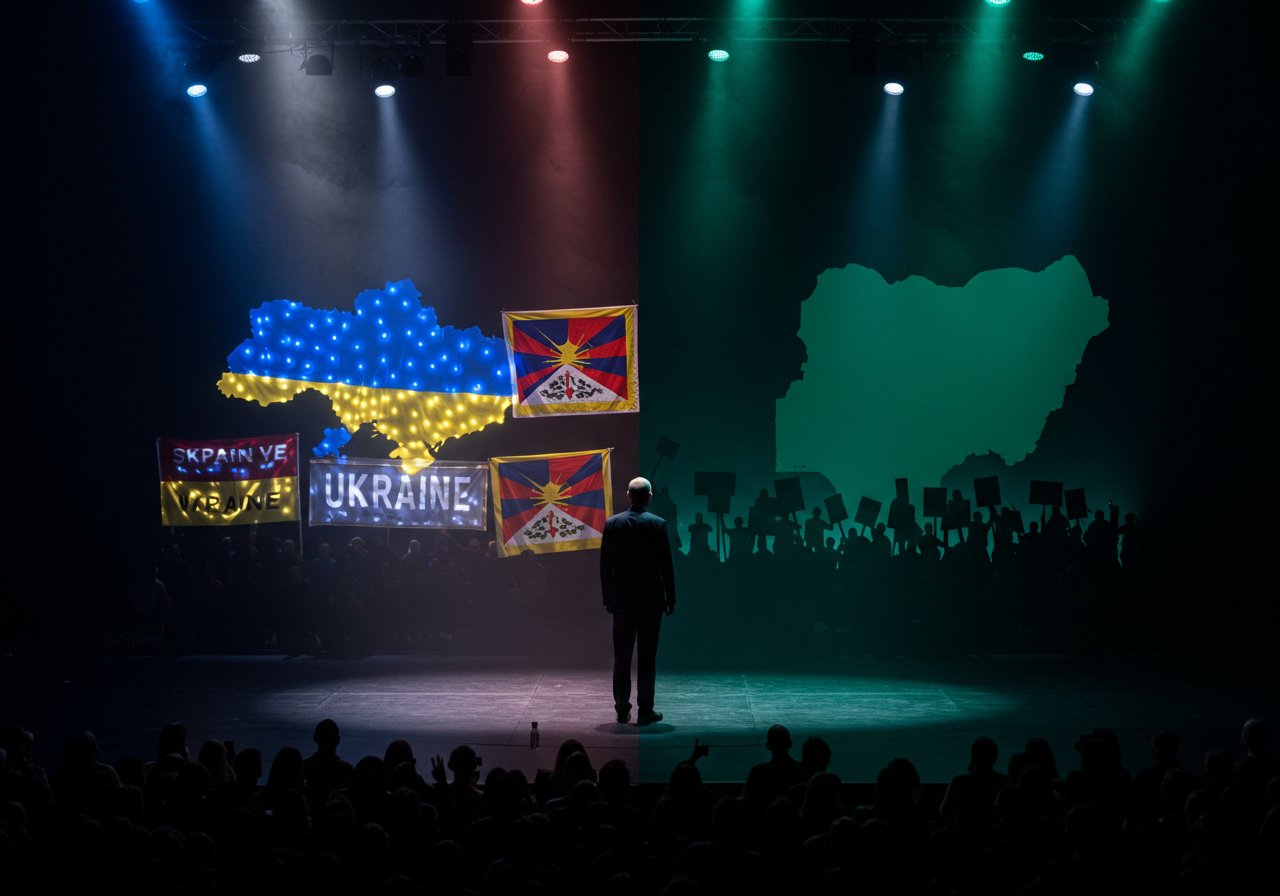
Why London champions Ukraine, Hong Kong, or Tibet—but not Biafra
11.1 – A Tale of Two Foreign Policies
In Westminster, the language of human rights is lofty and confident.
- Britain must stand with Ukraine, against Russian aggression.
- It must support Hong Kong, against Chinese authoritarianism.
- It must protect Tibetans, Uighurs, Kurds, and Afghans.
These causes find champions across the political spectrum. They animate speeches at party conferences. They fill headlines. They shape foreign aid, sanctions, and diplomatic pressure.
But when the conversation turns to Biafra, to Nnamdi Kanu, to extrajudicial rendition, or to Nigeria’s anti-Biafran repression?
Suddenly, Britain is silent.
The nation that calls itself a defender of freedom becomes a master of strategic ambiguity.
And nowhere is this hypocrisy more evident than in its treatment of Biafra.
11.2 – Britain’s Selective Moral Outrage
On February 16, 2025, The Guardian published a scathing article:
“Brother of British National Held in Nigeria Says UK Has ‘Turned Its Back’.”
The article described Kingsley Kanu’s efforts to pressure the British government into acting on behalf of his detained brother, Nnamdi Kanu, a British citizen kidnapped via extraordinary rendition.
Despite multiple legal victories in Nigerian and Kenyan courts, Kanu remained imprisoned.
The UK’s response?
“We continue to provide consular support.”
This is the same government that expelled diplomats over the poisoning of Alexei Navalny.
That called for sanctions after Jimmy Lai’s arrest in Hong Kong.
That supported Juan Guaidó as Venezuela’s “interim president.”
But for Kanu?
No statements in Parliament. No public condemnation. No action.
11.3 – Consular Rights, Applied Unequally
As Bindmans (2023) notes, the UK has consistently failed to treat Nnamdi Kanu’s case with the urgency or legal clarity it demands.
- He is a British citizen.
- He was illegally rendered from a third country (Kenya).
- He is being detained without fair trial.
- He has suffered documented health deterioration in custody.
Yet Britain has not demanded his release, not condemned the rendition, and not issued a public rebuke to Abuja.
As a comparison:
- When Nazanin Zaghari-Ratcliffe was detained in Iran, UK ministers made multiple diplomatic trips.
- When Matthew Hedges was jailed in the UAE, the Foreign Secretary intervened directly.
- When Jagtar Singh Johal was tortured in India, MPs raised his case repeatedly.
With Kanu?
Silence, and strategic stonewalling.
11.4 – Human Rights Rhetoric vs. Strategic Interests
Why the double standard?
The answer lies in Britain’s strategic interests in Nigeria:
- Oil and gas contracts in the Niger Delta
- Counter-terrorism intelligence sharing
- Trade relationships as Nigeria becomes one of Africa’s largest economies
- Historical ties through the Commonwealth and legacy diplomacy
As Africa Rebirth (2025) reports, the UK sees Nigeria as too big to antagonize and too strategically valuable to risk alienating over human rights.
And so, human rights rhetoric is applied where convenient, and suspended where it threatens British influence.
It is not policy.
It is performance.
11.5 – The “Good Authoritarian” Exception
In his 2024 article, Onyemechalu introduces the term “Good Authoritarian” to describe how Western powers tolerate democratic backsliding among allies—so long as they remain strategically aligned.
Nigeria, under this logic, is a model:
- It holds elections, even if flawed
- It hosts UK investment and military training
- It suppresses separatism under the guise of “national unity”
This gives London cover to ignore:
- Extrajudicial killings
- Media censorship
- Abuse of IPOB members
- The erosion of judicial independence
As long as Abuja plays its part in the regional order, Britain turns away.
The irony?
The country that helped draw Nigeria’s colonial borders now upholds them—at the cost of the freedoms it claims to champion.
11.6 – Genocide, Then and Now: Britain’s Long Silence
Britain’s hypocrisy toward Biafra did not begin in 2021.
As Declassified UK (2020) documented, the UK actively supported the Nigerian military during the Biafran War, supplying arms and diplomatic cover—even as evidence mounted of mass starvation, ethnic cleansing, and possible genocide.
More than two million Biafrans died.
The UK refused to call it genocide.
It still does.
Today, as the same ethnic group faces renewed military violence, arbitrary arrests, and media blackouts, Britain remains loyal to the same logic:
“Unity at any cost. Even if that cost is justice.”
The failure to reckon with 1967 has enabled a repeat of its moral failures in 2025.
11.7 – The Legal Tightrope: Saying Without Doing
The UK Foreign, Commonwealth & Development Office (FCDO) insists it is “monitoring developments” and “providing consular support” in Kanu’s case.
But behind these statements lies a legal tightrope.
According to Bindmans (2023) and Gov.uk (2022):
- The FCDO refuses to acknowledge Kanu was rendered illegally, despite rulings by Nigerian and Kenyan courts.
- It avoids classifying him as a victim of enforced disappearance, even though that classification would obligate stronger diplomatic action under international law.
- It claims to uphold “due process”—even when Nigeria’s own courts have been repeatedly ignored by the executive.
This is not a failure of information, but of political will.
Britain is choosing legal ambiguity over moral clarity—because clarity would require action.
11.8 – Whitehall’s Cold Bureaucracy
Behind the scenes, British officials have employed a familiar tactic: procedural delay.
As Al Jazeera (2023) and The Guardian (2025) report:
- Kanu’s family has faced repeated obstacles in securing consular visits.
- Letters from legal representatives have been met with form-letter responses.
- Freedom of Information requests about Britain’s role in Kanu’s rendition have been delayed or denied on “national security” grounds.
This bureaucratic stonewalling has a clear purpose:
- Avoid accountability
- Exhaust the legal team
- Let time do what policy cannot
In doing so, Britain replicates the very legal tactics it condemns in other authoritarian regimes—just cloaked in paperwork instead of barbed wire.
11.9 – Human Rights à la Carte
Britain’s approach to human rights is highly strategic—supporting causes that align with broader diplomatic or ideological aims.
Consider:
- Hong Kong: Prominent UK politicians wore protest badges in Parliament.
- Ukraine: British aid, arms, and asylum followed swiftly.
- Belarus: Sanctions were imposed after one rigged election.
But when a British citizen is:
- Illegally kidnapped across borders
- Detained indefinitely despite favorable rulings
- Silenced for calling for self-determination
Britain cites “ongoing legal matters.”
As Africa Rebirth (2025) notes:
“The human rights that Britain defends abroad stop at the door of its own imperial interests.”
11.10 – Legal Victory, Political Inaction
In 2022, a Nigerian appellate court ruled Kanu’s rendition illegal and ordered his release. The ruling was celebrated by activists and rights groups.
But instead of acting on the judgment, the Nigerian government:
- Appealed to the Supreme Court
- Cited “national security”
- Refused to comply
And Britain?
Said nothing.
As Bindmans (2023) pointed out, the UK made no effort to pressure Nigeria to comply with its own courts.
Even after a UK Court of Appeal expressed “deep concern”, British ministers maintained a studied silence.
This is not just complicity. It is diplomatic cowardice.
11.11 – When the Colonizer Picks Sides
Britain’s silence cannot be separated from its colonial legacy.
As the architect of Nigeria’s borders, Britain has always seen the unity of Nigeria as both a geopolitical asset and a moral mission—regardless of the human cost.
Today, that colonial instinct survives in Whitehall:
- Loyalty to Abuja
- Indifference to Igbo grievances
- A quiet aversion to reopening the “Biafra file”
As Declassified UK (2020) reported, the British government in the 1960s justified arms shipments to Nigeria by describing Biafran leaders as “misguided rebels.”
More than 50 years later, that language has evolved—but the policy remains the same:
Preserve the postcolonial order. At any cost.
11.12 – Britain’s Fear of the Precedent
Why is Britain so reluctant to act in Kanu’s case?
Because doing so would set a dangerous precedent:
- Acknowledging extraordinary rendition as illegal
- Condemning a strategic ally’s judicial misconduct
- Validating a separatist movement’s legal claims
- Reopening the legacy of colonial complicity in African conflicts
In short:
It would challenge the very structures Britain helped build.
To support Biafra—even in principle—is to admit that Britain’s decolonization process was incomplete, unjust, and unfinished.
That is a truth Whitehall is not ready to confront.
11.13 – Human Rights, With Exceptions
As the UK prepares to host human rights conferences, publish global freedom indexes, and lecture rival states on abuses, it must confront a hard fact:
Its silence on Biafra and Kanu is not a diplomatic oversight.
It is a deliberate exception to its own values.
The same government that says “all lives matter” in Gaza, Tibet, and Kyiv,
says nothing when an ethnic minority in Nigeria is brutalized—
even when the victim holds a British passport.
As Onyemechalu (2024) concludes:
“There is no neutrality in silence. There is only endorsement by omission.”
11.14 – The Biafra Britain Doesn’t Want to See
In London, thousands have marched for Ukraine.
MPs have held vigils for Tibet.
Public buildings have flown rainbow flags for global LGBT+ rights.
But for Biafra?
No embassy lit up. No mayor tweeted. No minister stood up in Parliament.
This isn’t about media oversight. It is deliberate invisibility.
As Africa Rebirth (2025) writes:
“Britain has made Biafra not just a historical taboo—but a policy blind spot.”
Because to acknowledge Biafra now is to confront:
- The illegality of Nnamdi Kanu’s rendition
- The bias in how human rights are defended
- The scars of empire that never fully healed
- The moral contradiction at the heart of UK foreign policy
And Britain—polished in diplomacy, steeped in colonial memory—is too invested in its own myth of fairness to face the truth in Biafra’s mirror.
11.15 – Justice Deferred Is Justice Denied
Legal victories mean little when they are ignored.
Court rulings collapse under diplomatic silence.
Constitutional protections die quietly, buried beneath strategic partnerships.
Kanu’s trials, his health decline, the stalling of his case, the British government’s studied detachment—these are not separate incidents. They form a pattern of deliberate neglect, made possible by a human rights system that picks its battles, and abandons those it cannot politicize safely.
Britain does not need to endorse Biafra to defend Kanu’s rights.
It does not need to support secession to condemn extraordinary rendition.
It does not need to redraw borders to tell the truth about 1967.
It only needs to honor the values it claims to represent.
11.16 – The Cost of Hypocrisy
Britain’s double standard carries more than moral cost.
It weakens:
- Its credibility in the Global South
- Its moral authority in international institutions
- The trust of its own diaspora communities
- Its post-Brexit image as a “Global Britain” that stands for justice
Each time Britain overlooks a case like Kanu’s, it reinforces the idea that human rights are a Western tool, not a universal principle.
And that idea—that justice is transactional, not universal—is exactly what the UK claims to oppose when it speaks of Russia, China, or Iran.
You cannot fight for global values with selective outrage.
You cannot lead the free world with colonial blinders on.
11.17 – What Biafra Asks of Britain
Biafra is not just asking for a new nation.
It is asking for truth.
About war. About justice. About empire.
It is asking Britain to be consistent, not convenient.
To choose principle, not profit.
To treat Igbo lives as equally sacred as Ukrainian, Tibetan, or Hong Kong lives.
It is asking Britain to look back—honestly.
To act now—urgently.
And to stop hiding behind silence.
Because in the courtroom where justice stalls,
in the embassy where help never comes,
in the headlines that never run,
in the colonial file still marked “classified”,
a question echoes louder each year:
If not now, Britain—then when?
Part 12 – The Future: Biafra’s Rise or Kanu’s Silence?
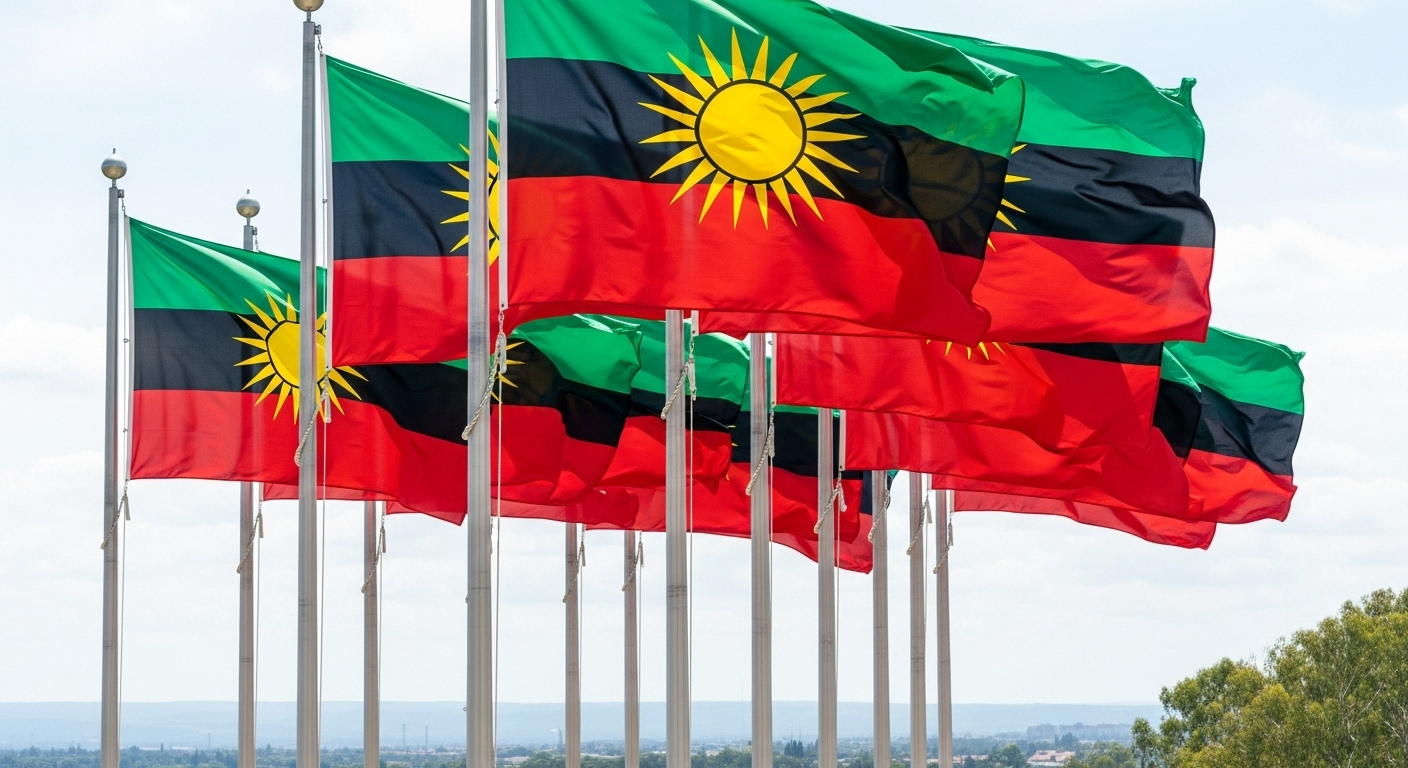
Will Britain and Nigeria succeed, or will Biafra’s call outlive their conspiracy?
12.1 – Between Silence and Survival
As the series reaches its end, the question remains:
Has the conspiracy to silence Nnamdi Kanu — and bury the dream of Biafra — succeeded?
From courtrooms to embassies, from oil contracts to media silence, the forces arrayed against Biafra are vast, coordinated, and unrelenting.
Yet, despite arrests, blackouts, and betrayals, the call for Biafra persists.
It lives on in protests, broadcasts, underground organizing, and diaspora voices.
What we are witnessing is not the quiet end of a rebellion.
It is the crossroads between suppression and resurrection.
12.2 – Kanu’s Body, Biafra’s Burden
Nnamdi Kanu remains detained.
His health has deteriorated.
His trials continue in a loop of delays and appeals.
The Nigerian state denies him medical freedom; the British state denies him diplomatic urgency.
But Kanu’s body has become a symbol larger than the man himself.
It is now:
- A legal battleground
- A political hostage
- A spiritual totem for a cause that no court ruling can kill
The longer he is held, the more he embodies what the Biafran struggle has always been — chained, betrayed, but unbroken.
12.3 – What Britain Still Hopes
Britain hopes time will bury the issue.
It hopes Kanu fades from the headlines.
That IPOB fragments under pressure.
That Nigeria moves on.
That the ghosts of empire stay quiet in their archives.
This is the same strategy used in the 1960s:
- Delay truth
- Support “stability”
- Let African lives be the cost of British silence
But today’s Biafra is not the same.
It is global.
It is digital.
It is not asking permission anymore.
12.4 – Nigeria’s Gamble
The Nigerian government believes that crushing IPOB at home — and isolating it abroad — will save the republic.
It relies on:
- Security forces in the Southeast
- Biased courts and emergency laws
- State-backed media campaigns
- Quiet approval from international partners
But in doing so, it is fueling the very rage it hopes to smother.
The longer Kanu is held, the more valid IPOB’s warnings of “ethnic targeting” appear.
Every protest crushed becomes proof.
Every court ignored becomes a rallying cry.
This is not just repression. It is radicalization by design.
12.5 – The Risk of a Leaderless Movement
The longer Kanu is silenced, the greater the risk of a fractured IPOB — or worse, a leaderless escalation.
When moderates are jailed and dialogue is impossible, the vacuum is filled by:
- Exiled voices pushing harder lines
- Underground factions losing faith in peaceful activism
- Opportunists with no accountability
In suppressing one man, Nigeria may be creating ten more — each more angry, more decentralized, and more disconnected from diplomacy.
Kanu’s silence is not peace.
It is the pause before a harder question.
12.6 – Biafra Without Borders
The Biafran cause has outgrown Nigeria’s borders — and Kanu’s cell.
It now moves through:
- Diaspora protests from New York to Berlin
- Online movements that ignore censorship
- Cultural revival through language, memory, and music
- Legal challenges in foreign courts
It no longer needs permission from governments.
It only needs a platform.
And it’s found many — even as mainstream media turns away.
What Britain and Nigeria fear most is not civil war.
They fear a slow international recognition of moral failure.
Because if the world begins to listen,
then everything both states have denied — about history, justice, and rights — becomes undeniable.
12.7 – The Silence Is the Strategy
In both Abuja and London, silence isn’t absence. It’s policy.
When governments refuse to speak about Kanu, refuse to name the rendition, refuse to acknowledge Biafra as a political question — they are not passive. They are calculated.
The idea is simple:
No recognition means no legitimacy.
No legitimacy means no negotiation.
No negotiation means indefinite containment.
But history shows this doesn’t work forever.
Silence eventually becomes evidence — evidence that something is too dangerous to say because it’s too true to deny.
12.8 – What the World Sees
Outside the UK and Nigeria, the world is beginning to take notice — slowly, cautiously, but noticeably.
- Human rights organizations have started documenting the rendition and detention.
- Diaspora communities are building coalitions with other self-determination groups.
- UN human rights rapporteurs have quietly requested updates on Kanu’s case.
- African diasporic thinkers are connecting Biafra to broader anti-colonial justice movements.
It’s not yet a headline.
But it’s becoming a conversation — and conversations, once started, are hard to stop.
Especially when they speak the language of law, freedom, and memory.
12.9 – The Generational Turn
Young Nigerians — at home and abroad — are not bound by the trauma of the war, but they are haunted by its silence.
This generation is:
- Online
- Politically aware
- Tired of inherited narratives
- Disillusioned by “One Nigeria” when justice is denied
To them, Biafra is no longer a taboo.
It’s a question: What if we were never meant to fit into this broken map?
The state can ban flags and radio stations.
But it cannot ban questions in the minds of the youth.
And questions — when unanswered — become movements.
12.10 – What Justice Could Look Like
The demand is not just independence.
It’s accountability.
Justice means:
- Admitting Britain’s role in the Biafran War
- Naming Kanu’s rendition as illegal
- Holding Nigeria to its constitutional and human rights obligations
- Ending the blanket branding of IPOB supporters as terrorists
- Allowing peaceful organizing and political speech
- Creating space for self-determination to be discussed without fear
It is not war that Biafra asks for.
It is the right to ask for something different — without being killed or disappeared for it.
12.11 – If Kanu Dies in Detention
It must be said clearly: if Nnamdi Kanu dies in Nigerian custody,
neither Nigeria nor Britain will control the consequences.
His death would:
- Spark mass unrest across the Southeast
- Deepen distrust among younger Igbos toward the state
- Ignite anger across the diaspora
- Turn a flawed judicial process into a martyrdom
- Shift international opinion from cautious to critical
And the silence that surrounds him now would become deafening.
Not as protection — but as indictment.
12.12 – Biafra Is Already a Reality — Just Not Yet a State
Biafra exists in memory.
In exile.
In cultural pride.
In resistance.
In international law filings.
In encrypted broadcasts.
In hashtags and hunger strikes.
In mothers marching and lawyers litigating.
In silence — and in refusal to be silenced.
The state has not come.
But the spirit has never left.
And no court, government, or foreign ministry has yet been able to kill that.
12.13 – What If the World Listens Too Late?
This exposé began with a conspiracy — to silence Kanu, to silence Biafra.
But the greater danger is not the conspiracy.
It is the indifference that enables it.
If the world waits too long —
If Britain keeps pretending it has no role —
If Nigeria keeps believing repression equals stability —
Then it will not be Biafra that breaks.
It will be what’s left of the lie that this was ever about peace, law, or unity.
12.14 – Between Empire and Emancipation
Biafra sits at the fault line between empire and emancipation.
It is not just a local struggle — it is a global reckoning with the broken promises of decolonization:
- Borders drawn in ink but enforced in blood.
- Independence granted, but freedom deferred.
- Sovereignty declared, but identity denied.
Britain would rather forget it ever created this fracture.
Nigeria would rather pretend the wound has healed.
But history doesn’t disappear just because it’s politically inconvenient.
And injustice doesn’t expire just because the cameras moved on.
12.15 – The Burden of Memory
Every silence imposed by the state — every redacted file, every banned headline, every jailed activist — has created the opposite of forgetting.
It has created a burden of memory that the next generation now carries.
This is not nostalgia. It is resistance.
Biafran identity is no longer just about the past.
It is about reclaiming agency in a world that has constantly denied it.
And whether that leads to a referendum, autonomy, or something entirely new —
it will not be shaped by dictates from Abuja or quiet nods from London.
It will be shaped by Biafrans — everywhere — who refuse to forget.
12.16 – The End Is Not the End
This series does not end with certainty.
It ends at a crossroads.
One road leads to:
- More silence.
- More court delays.
- More diplomatic hedging.
- More unmarked graves and unnamed martyrs.
The other road — the harder one — leads to:
- Justice.
- Truth.
- Accountability.
- The right to choose — not just to live, but to live freely.
The governments of Britain and Nigeria may believe they still control the outcome.
But the truth is:
They no longer own the narrative.
12.17 – The Question That Won’t Die
In a quiet cell in Abuja, a man waits.
Across the world, a people remember.
On airwaves, in forums, at protests, in exile — the call still echoes.
Biafra.
Not as a fantasy.
Not as a rebellion.
But as a question:
“What if we were never meant to remain silent?”
And as long as that question lives,
no court, no border, no oil deal,
and no empire — past or present —
will ever truly silence it.
References
Africa Rebirth (2025). When Oil Was Worth More Than Lives: Britain’s Role in the Biafran War. Africa Rebirth, 31 May. Available at: https://www.africarebirth.com/when-oil-was-worth-more-than-lives-britains-role-in-the-biafran-war/ [Accessed 2 Sep. 2025].
Al Jazeera (2023). ‘Nigerian Separatist Leader’s Brother Loses London Court Challenge Against UK’. Al Jazeera, 23 Mar. Available at: https://www.aljazeera.com/news/2023/3/23/biafran-separatist-leaders-brother-loses-london-court-challenge-against-uk [Accessed 2 Sep. 2025].
Bindmans (2022). ‘Case Comment: Nnamdi Kanu’. Bindmans Blog, 30 Sept. Available at: https://www.bindmans.com/news-insights/blogs/case-comment-nnamdi-kanu/ [Accessed 2 Sep. 2025].
Bindmans (2023). ‘UK Court of Appeal Expresses “Deep Concern” about the Treatment of Nnamdi Kanu’. Bindmans News, 22 Mar. Available at: https://www.bindmans.com/news-insights/news/uk-court-of-appeal-expresses-deep-concern-about-the-treatment-of-nmandi-kanu/ [Accessed 2 Sep. 2025].
Browne, A. (2025). When Oil Was Worth More Than Lives: Britain’s Role in the Biafran War. Africa Rebirth, 31 May. Available at: https://www.africarebirth.com/when-oil-was-worth-more-than-lives-britains-role-in-the-biafran-war/ [Accessed 2 Sep. 2025].
Collector (2023). ‘The Nigerian Civil War: Foreign Intervention, Oil & Ideology’. The Collector, 29 Jan. Available at: https://www.thecollector.com/nigerian-civil-war-foreign-intervention/ [Accessed 2 Sep. 2025].
Curtis, M. (2020). ‘How Britain’s Labour Government Facilitated the Massacre of Biafrans to Protect Oil Interests’. Declassified UK, 29 Apr. Available at: https://www.declassifieduk.org/how-britains-labour-government-facilitated-the-massacre-of-biafrans-in-nigeria-to-protect-its-oil-interests/ [Accessed 2 Sep. 2025].
Declassified UK (2020). ‘How Britain’s Labour Government Facilitated the Massacre of Biafrans in Nigeria to Protect Oil Interests’. Declassified UK, 29 Apr. Available at: https://www.declassifieduk.org/how-britains-labour-government-facilitated-the-massacre-of-biafrans-in-nigeria-to-protect-its-oil-interests/ [Accessed 2 Sep. 2025].
Folayan, B.J., Oladipupo, T.A. and Adeyemo, F.O. (2021). ‘Post-war Civil War Propaganda Techniques and Media Spins in Nigeria’. arXiv preprint. Available at: https://arxiv.org/abs/2105.07841 [Accessed 2 Sep. 2025].
Gov.uk (2022). Country Policy and Information Note: Separatist Groups in the South-East (Nigeria). UK Home Office. Available at: https://www.gov.uk/government/publications/nigeria-country-policy-and-information-notes/country-policy-and-information-note-separatist-groups-in-the-south-east-nigeria-march-2022-accessible [Accessed 2 Sep. 2025].
Guardian (2021). ‘Biafra Separatist Leader Abducted by Nigeria from Kenya, Say Family’. The Guardian, 9 Jul. Available at: https://www.theguardian.com/world/2021/jul/09/biafra-separatist-leader-abducted-nigeria-kenya-family-alleges-nnamdi-kanu [Accessed 2 Sep. 2025].
Guardian (2025). ‘Brother of British National Held in Nigeria Says UK Has “Turned Its Back”’. The Guardian, 16 Feb. Available at: https://www.theguardian.com/world/2025/feb/16/nnamdi-kanu-brother-kingsley-british-citizen-held-nigeria [Accessed 2 Sep. 2025].
Okolocha, D.O. (2023). Textual Analysis of Netizens’ Reactions to Nnamdi Kanu’s Extraordinary Rendition. Ebonyi State University Journal of Mass Communication, 10(1), pp.1–17. Available at: https://www.ebsujmc.com/uploads/338526_1686260744.pdf [Accessed 2 Sep. 2025].
Okpevra, U. (2023). ‘Historicising Foreign Powers’ Intervention in the Nigeria–Biafra War’. IAFOR Journal of Arts & Humanities, 10(1), pp.66–80. Available at: https://iafor.org/archives/journals/iafor-journal-of-arts-and-humanities/10.22492.ijah.10.1.05.pdf [Accessed 2 Sep. 2025].
Onyemechalu, S.J. (2024). ‘Long-distance Nationalism, Diaspora Mobilisation, and the Renewed Biafra Broadcast from London’. Studies in Conflict & Terrorism. Available at: https://journals.sagepub.com/doi/10.1177/14687968231208307 [Accessed 2 Sep. 2025].
Premium Times (2025). ‘SSS Not Involved in Nnamdi Kanu’s Arrest in Kenya – Prosecution Witness’. Premium Times Nigeria, 21 May. Available at: https://www.premiumtimesng.com/regional/ssouth-east/795874-sss-not-involved-in-nnamdi-kanus-arrest-in-kenya-prosecution-witness.html [Accessed 2 Sep. 2025].
Reuters (2024). ‘Nigerian Court Denies Separatist Leader Kanu Bail, Orders Trial’. Reuters, 19 Mar. Available at: https://www.reuters.com/world/africa/nigerian-court-denies-separatist-leader-kanu-bail-orders-trial-2024-03-19/ [Accessed 2 Sep. 2025].
Reuters (2025). ‘Separatist Kanu Faces New Trial in Nigeria Under Fourth Judge’. Reuters, 21 Mar. Available at: https://www.reuters.com/world/africa/separatist-kanu-faces-new-trial-nigeria-under-fourth-judge-2025-03-21/ [Accessed 2 Sep. 2025].
Smith, K.E. (2025). ‘The UK and “Genocide” in Biafra: Strategic Messaging to Justify Federal Support’. London School of Economics (LSE) Working Paper. Available at: https://eprints.lse.ac.uk/59261/ [Accessed 2 Sep. 2025].
Thenicheng (2025). ‘Kenyan Court Declares Nnamdi Kanu’s Rendition to Nigeria Illegal’. The Nicheng, 27 Jun. Available at: https://thenicheng.com/kenyan-court-declares-nnamdi-kanus-rendition-to-nigeria-illegal/ [Accessed 2 Sep. 2025].
Uche, C.-U. (2019). Oil, British Interests and the Nigerian Civil War. University of Nigeria, Enugu Campus. Available at: https://warwick.ac.uk/fac/arts/history/students/modules/hi277/programme/t2w11/hi277_uche_biafra_uk.pdf [Accessed 2 Sep. 2025].
Uche, C.-U. (2024). ‘A Review of British Policy and Influence on External Meddling in the Peacemaking of the Nigeria–Biafra War (1967–1970)’. Saint Petersburg Historical Journal, 3, pp.163–178. Available at: https://www.researchgate.net/publication/386045327_A_Review_of_British_Policy_and_influence_on_the_External_Meddling_in_the_Peacemaking_and_Conflict_Resolution_of_the_Nigerian-Biafra_War_1967-1970 [Accessed 2 Sep. 2025].

